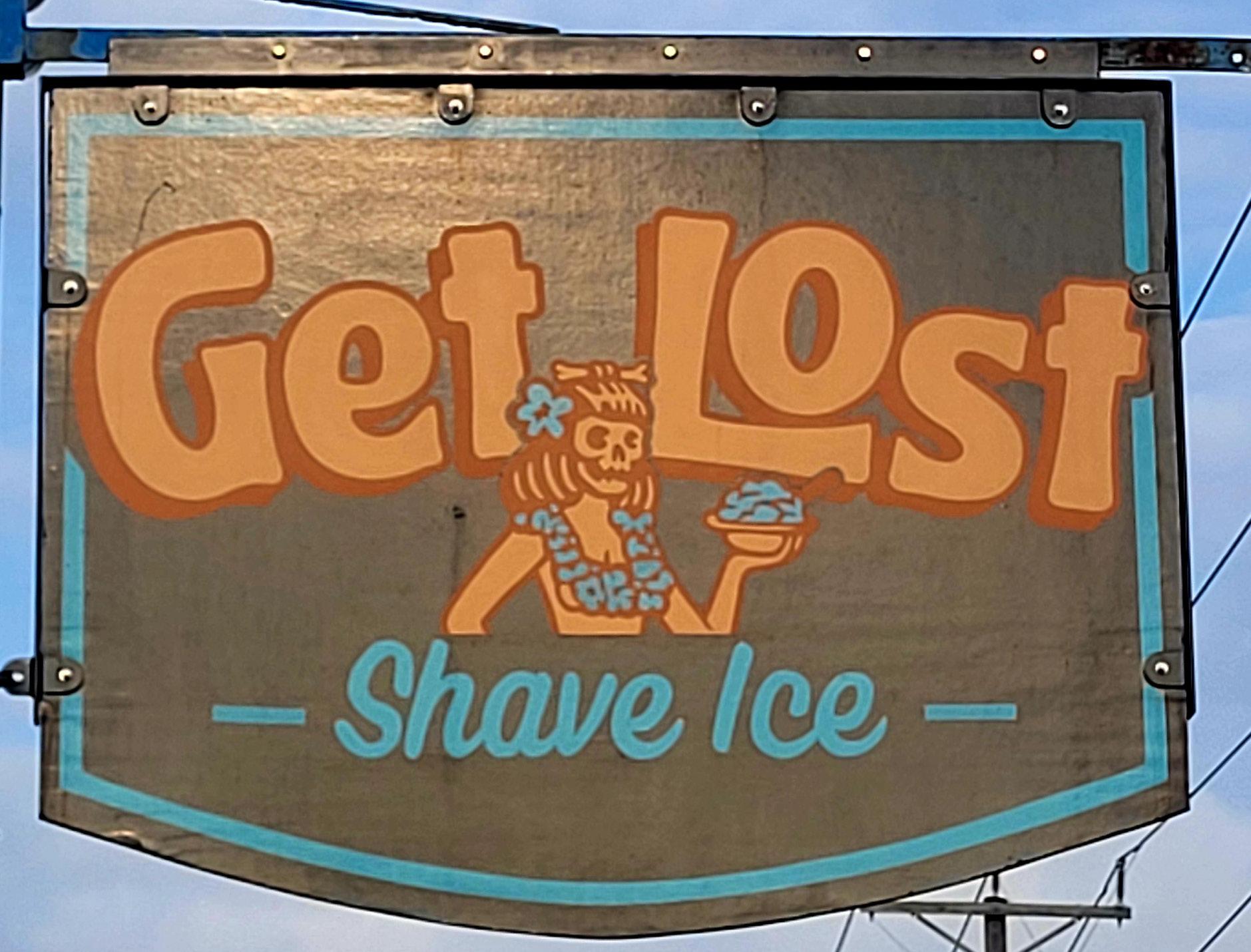The Marlin Chronicle



The long-running musical comes to VWU with Vaudeville influences and a scathing critique of the justice system.
BY GABRIELLE BARNETT gabarnett@vwu.edu
“Oh!” Roxie Hart, played by sophomore Stephanie Clark, exclaimed, her shiny pink robe fluttering in the bright stage lights. “I gotta pee!”
The audience broke into laughter as she ran off the stage, prop gun still clutched in hand and the lover she’d shot left laying center stage. That was only one of many surprising, darkly funny moments featured in “Chicago.”
The Susan S. Goode Fine and Performing Arts Center performed “Chicago,” a 1975 musical about the 1920s legal scene, from Thursday, Oct. 3, through Sunday, Oct. 6. The show is a dark satire about celebrity
trials and 1920s culture.
Dr. Travis Malone, professor of Theatre and the Anne B. Shumadine Dean of the Batten Honors College, said that the musical was selected for its artistic variety and merit. Malone, the director, added that “Chicago” is one of his favorite productions.
“It’s one of those really important pieces,” Malone said. “Everyone loves it because it’s dark and because it’s cynical, and it sort of embraces this cynical side of American culture.”
According to the New York Theatre Guide, “Chicago” is based on the investigative journalism and 1926 play of the same name by Maurine Dallas Watkins. The “Chicago” musical was written by
popular writer Bob Fosse with music by John Kander and lyrics by Fred Ebb.
The musical follows the exploits of two burlesque performers, Velma Kelly and Roxie Hart, as they fight for fame during the jazz age.
Clark, who plays Roxie Hart, spoke to some of the distinct elements of “Chicago.”
“The whole thing is kind of like Roxie seeing a show–like it’s a show in her mind,” Clark said. “It demonstrates how much everything in the world can be an act.”
In that theme, “Chicago” incorporates a typical cultural element from the American jazz age: vaudeville. Vaudeville was a
See ‘CHICAGO’ Page 4
BY CLAY YOKOM kayokom@vwu.edu
Virginia Wesleyan University was included in “The Best 390 Colleges 2025 Edition” in the Princeton Review and was 155 out of 194 in the “2024 Liberal Arts Colleges Ranking” by Washington Monthly.
“I like the community. I feel like there’s always something to do here,” Natailie Gillot, a student-athlete and freshman, said. Graphic Design major and freshman Davieon Thornton added to this, outlining the campus size.
“Everyone is really active, and it’s not like a really huge campus,” Thornton said.
The Princeton Review’s national list of colleges is made using data from student respondents who answer and rank their institutions. The Princeton Review explained that 168,000 students’ ratings of their colleges were the entire basis of their rankings.
On their website, The Princeton Review said it “does not rank schools overall 1-390” and that the list is alphabetical instead. The main distinction on the list are the featured colleges. The featured designation is a paid position which gives a yellow background to the institution and allows an addition of an image.
Washington Monthly said it ranks liberal arts colleges “based on their contribution to the public good in three broad categories: social mobility, research, and promoting public service” on its website.
In addition to the total ranking, the Washington Monthly gives more specific rankings in the three categories that it ranks institutions in. Virginia Wesleyan placed at 154 in social mobility, 182 in research and 67 in service out of a total of 194 for all of them.
The social mobility score is a combination of the ratio of students receiving Pell grants to the total school size, students graduating at a higher rate than their non-grant receiving peers, along with affordability of an institution and the graduation rate of first generation students.
BY AVERY BELISLE agbelisle@vwu.edu
Following the retirement of the sole German professor, Susan Wansink, there are currently no in-person German language classes offered at Virginia Wesleyan University.
At Virginia Wesleyan, discussions about the breadth of language offerings have sparked interest in enhancing the university’s commitment to providing diverse language options.
As VWU aims to foster global citizenship and promote international education, students and faculty members are questioning the effectiveness of current offerings and advocating for the inclusion of new languages that reflect the evolving cultural landscape.
Currently, VWU offers an array of language programs, limited to European languages. Students can attend Spanish and French language classes on campus
for a modern language education, as well as Latin and Greek language classes for a more classical education.
Although French, Spanish and Latin are in high demand for many universities, this language selection has left some feeling unsupported in their educational pursuits.
“I had planned to take German 1 through 4, but was cut off after German 2 because of the lack of offered German content,” said Tidewater Community College student Nisan Bates. Bates attends classes and events at Virginia Wesleyan as a part of TCC’s dual enrollment program, and now has his German plans put on hold.
Although the changes to the German offerings are fairly recent, there has been demand for expanded language courses at VWU for a long time, especially for Asian languages. “VWU lacks Asian representation, especially in the language department. Including these languages would reiterate our commitment to diversity
Letter to the Editor -Page 6
“[A]s an institution, we have not been ‘flailing’ or ‘failing’ with recruiting students of diverse backgrounds and identities” - Kaza Dayton, BHC Office Assistant
beyond what is typically imagined,” junior Andrew Steiner said.
Other students have expressed that Japanese would be a worthy addition to Virginia Wesleyan’s course offerings, considering their advertised partnership with Lakeland University, a campus located in Tokyo, Japan.
Although Japanese is offered to American students at Lakeland, it is currently not possible to begin or continue their Japanese language studies at VWU.
“I would fully support and endorse a Japanese course being taught here,” said graduate student Rowan Stuart. He shared how he believed that Japanese language skills could have augmented his experience abroad. “The language limitations of our students restrict many of the benefits of an education abroad; we ought to prepare our students by providing them the education they need to explore the world. Language courses, like Japanese, are necessary for
Human Trafficking DocuDrama generates attention -- Page 3
“We need to talk about these things” - Elliot Fylstra

true international experiences,” Stuart said.
“If we truly wish to showcase Wesleyan’s prowess, being able to do so in a host institution’s language is paramount,” he said. Stuart also emphasized that this could improve the reputation and image of the school.
See LANGUAGE Page 2
Men’s Soccer makes a statement -- Page 7
“Virginia Wesleyan University’s Men’s Soccer is a force to be reckoned with and is one of the best teams in the country.” - Everett McCloskey, Midfielder
De Rosa takes over student counseling -Page 4
“When I was an intern here, ... it just really allowed me to grow into the person and clinician I am.” - Michelle De Rosa, Director of Counseling and Student Health
Corrections & Context -- MOCA Construction, 1
Author is Avery Belisle -- Pull quote, 3
Speaker is Dr. Malone, not President Miller -- Spelling, puntuation and grammar
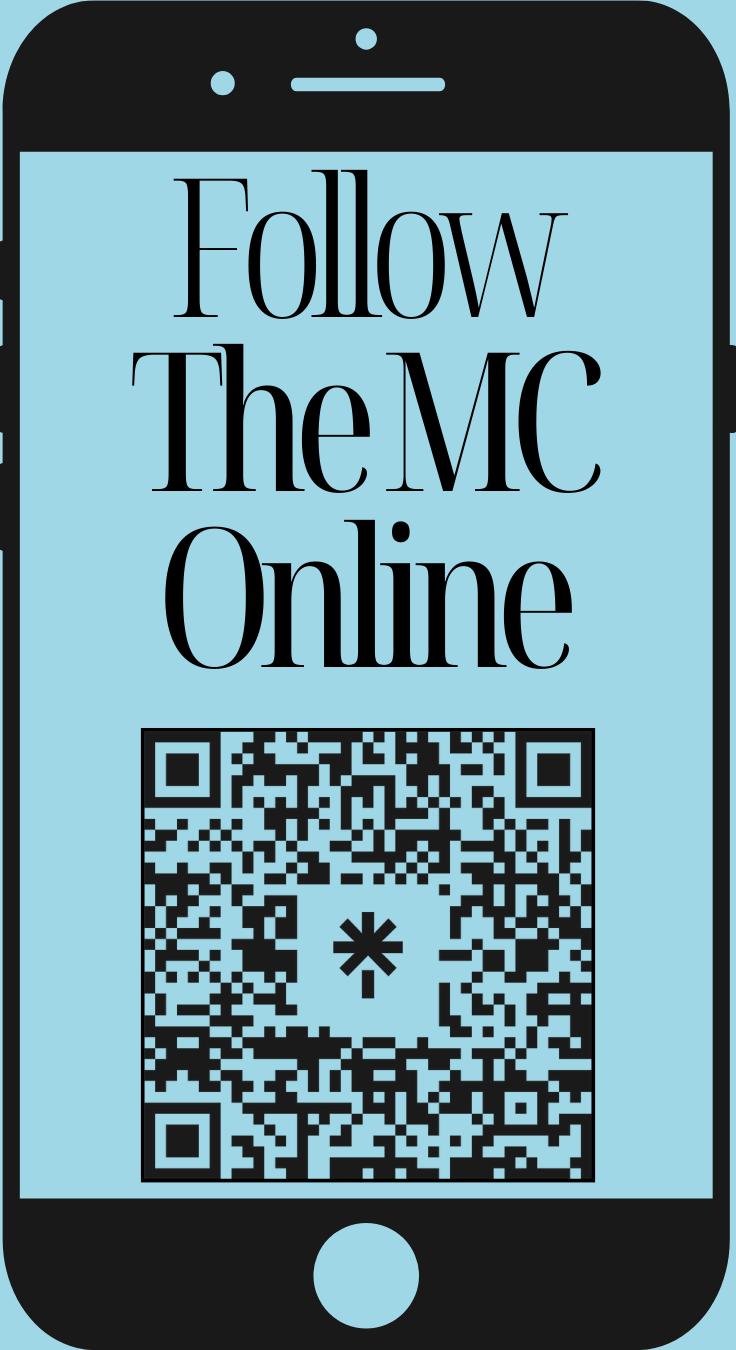
the violation.
BY ISAAC FICK
Despite no fewer students having vehicles on campus this year, administrative members have reported fewer registrations for parking passes than years past.
As specified by Associate Vice President for Campus Life and Operational Management Jason Seward, “we have seen an issue this year, more so than years past, of students not registering their vehicles.”
Seward expanded on the consequences of this. “Students have been ticketed for not having their vehicle registered,” Seward said. “If you’re not registered with a current decal for the specific year, it’s a parking ticket.”
As outlined in the Virginia Wesleyan University website, parking and traffic violations are $50, with exception to parking in a handicapped parking space or fire line, which is a fine of $100.
According to the Old Dominion University website, most violation fines range from $15 to $250 depending on the violation. Christopher Newport University’s website shows that fines range from $10 to $80, with the greatest violation reaching $500. Citations for all institutions must be appealed within 7 days of
“If anybody wants to speak about a parking violation that they’ve gotten from security, all they need to do is reach out to the security office,” Seward said.
“The violations are a bit much,” junior and commuter Brennan Black said. He said that while he has not received any tickets himself, “I see people get them at the beginning of each semester, especially with the freshmen.”
“It … shouldn’t be $50 for parking in a faculty parking spot,”
junior Ryan Koval said.
Concerning faculty parking spots, Koval had additional suggestions. He expressed that “the faculty parking spaces should only be reserved during certain times and during the school week M-F.”
“If they are available for students to park in on the weekends then it should be stated clearly on the signs,” Koval said.
Seward acknowledged the areas designated to faculty/staff parking, but said “it’s a lot less than it used to be.” He added, “there used to be restricted areas throughout and we really opened parking.”
According to Seward, students often do not get ticketed other than for an unregistered vehicle.
“We don’t really have an issue
proportion of registration.
with people parking in handicap spaces or in fire lanes or things like that, because they’re clearly marked,” Seward said.
Seward noted that occasionally students will park in the faculty/ staff parking overnight. He added that in this case, if a student does not move their vehicle by the next morning, they will receive a ticket.
The purpose of vehicles being registered on campus is to ensure anyone entering campus has business or reason to be on campus, as stated by Seward.
“We want to know what everyone’s business here on campus is,” Seward said. “It’s an easy way to identify.”
Corresponding with this, Seward clarified the reason for the specific location of decals, being the driver’s side of the windshield. In that location, the decals are “easily seen as they come through the gate,” Seward said. “That signifies that we have somebody approaching the gate that is supposed to be here.”
Black outlined that vehicle registration is not a difficult process. “It’s pretty straightforward for the most part, registration isn’t too much of a hassle,” he said.
At Old Dominion University, the resident student parking
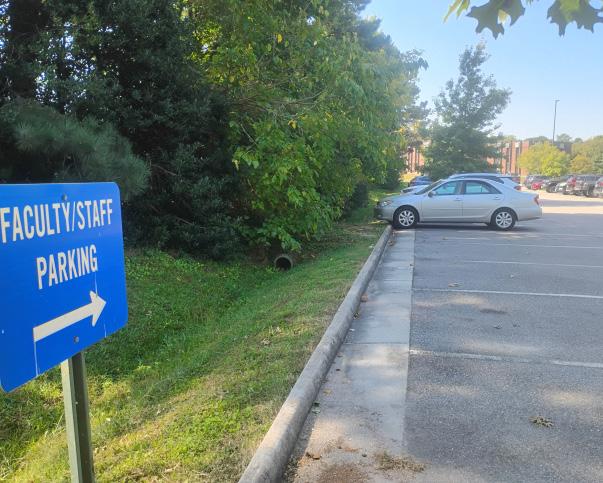
Row of reserved faculty/staff parking spots behind Allen Village.
Korean is also a frequently suggested language among Virginia Wesleyan’s students. For example, Steiner, who has Korean heritage and studied abroad in South Korea, said that “Korean could be a valuable language for students to learn, especially considering Korean culture is very prevalent among our generation (kpop/ kmovie/kdrama) and therefore a popular study abroad or travel destination.”
“It would prepare students for a globalized job market, where bilingual skills are highly valued. Korean…is significant due to South Korea’s growing economic and cultural influence,” senior Grace Park said. Park, an international student from Korea pursuing her full degree at Virginia Wesleyan, emphasizes its relevance to American students.
“Offering more language options fosters cultural diversity and enriches students’ global perspective, aligning with modern educational goals of producing well-rounded, internationally minded graduates. This could also attract a broader range of students, enhancing the university’s appeal and competitiveness,” Park said. Students have argued that
increasing language course offerings at Virginia Wesleyan could have a number of benefits for students, and even the university itself.
Dr. Alain Gabon, the sole French professor at Virginia Wesleyan, expressed concern over the current limited offerings.
“The vast majority of our students do not spend a single hour in their 4 years here learning any language,” Gabon said. Gabon further emphasized that language learning is important to a student’s global citizenship, “unless suddenly, what is the first, most ubiquitous, most pervasive and most permanent inescapable reality one encounters and has to deal with the second we set foot outside the English-speaking world is no longer that people out there do not speak or understand English and only a small minority of the world’s humanity do.”
Considering VWU’s title of “Global Campus” and its emphasis on quality education in the humanities, those advocating for an expansion of the language program argue that diversity is necessary to align with these pursuits.
“At the moment, I would say that, despite our grand professions of faith, the education we are giving our students is anything but international, and even less global. And cutting the few, already minimal language
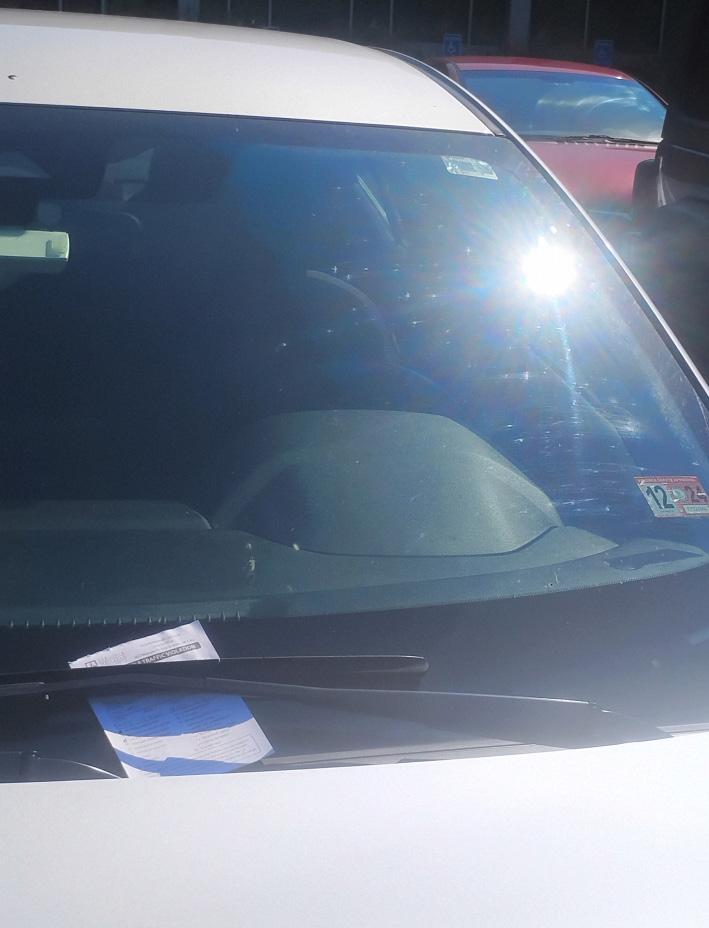
pass for one semester is $176.
Christopher Newport University’s academic year parking pass is $275.
When Virginia Wesleyan compares, the parking pass for an academic year is $150.
“We’re not the most expensive . . . We stay consistent, we stay fair,” Seward said.
Seward claimed that there is not a parking space issue. “We don’t have a parking problem. We have a walking problem,” he said.
Adding to this, Seward mentioned the correlation between registered vehicles and parking spaces available.
“We have more parking spaces than we have registered vehicles,” Seward said. “Both from the student side and the faculty/staff side.”
According to Seward, the university uses this money for operational costs. “It goes to paying for safety … [and] maintenance of parking lots, painting lines,” Seward said. Seward explained that the intention behind the fee is keeping these costs separate from the university’s sticker price. “That way, the consumer doesn’t see an increase on the tuition side as much.”
“We don’t have parking problem. We have a walking problem.”
Jason Seward, Associate Vice President for
Campus
Life
“There’s more than enough parking space here … just not as conveniently located to the places somebody may need to be or want to be at that time,” Seward said.
Seward added to this, noting that while a less convenient walk is possible, “our farthest walk from parking lot to parking lot is probably Brock Village … all the way up to the Goode Center,” he said. “That’s still under just around 800 yards.”
Seward emphasized that along with being a close knit university, there is also enough parking space to support the functions of the institution.
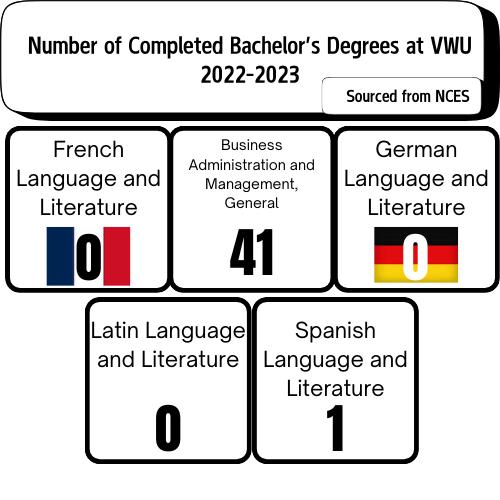
BY BRADY KING bpking@vwu.edu
Recently, a new Just Baked vending machine has been installed outside the Boyd Dining Center.
According to their website, Just Baked vending machines are popping up in schools and public places, and they’re changing the way we think about snacks. “Just Baked Smart Bistro provides venues such as colleges, hospitals, resorts, airports and casinos with 24/7 availability.” For Virginia Wesleyan students the 24/7 access to Just Baked is limited due to the fact that the Batten Center is not open past 10 p.m. during the week.
Just Baked vending machines are designed to bake fresh treats on the spot. The machines are equipped with ovens and special technology that ensures the snacks are cooked perfectly every time, according to Just Baked.
“I do believe that it would be worth it,” Half Baked Club’s Dough Keeper and sophomore Marquez Glover said. “However the idea has to be implemented and located where students can
access it more efficiently, like the 24 study lounge.”
“It is put in an area that closes past a certain time,” junior Kyla Robberecht said. She thought the machine should provide more options outside of the dining center. “Putting it where students can access it 24/7 would be a bit
"The idea has to be implemented and located where students can access it more efficiently."
Marquez Glover, Dough Keeper of Half Baked Club
better,” Robberecht said.
“I saw the vending machine as an opportunity,” Glover said.
“I was thinking it was a way for students on campus to have a late night snack, but I was disappointed since it exists by the
cafe and it’s not as practical as it may seem.” Glover explained that he was disappointed by the location of the vending machine.
With the machine being just outside the Boyd Dining Center, students have both options: the vending machine and dining center.
“It wouldn't be as much as a benefit since you have to pay out of pocket money,” Half Baked Club’s President and sophomore Jaylin Diggs said. Comparing the vending machine to the dining center, Diggs elaborated, “in the cafe you do have to wait but you can get as much food you want for a single meal swipe.”
Glover also discussed that the quantity of food for the prices is what has encouraged him not to order anything from Just Baked yet. “I saw it more convenient to just buy the items from the grocery store,” Glover said. “You even get more than what the machine offers for around the same price.”
“I feel like the portion sizes are really small,” junior Becca Haegele said. “$11 for … alfredo that doesn’t even cover half of the bottom tray is just kind of pricey.”
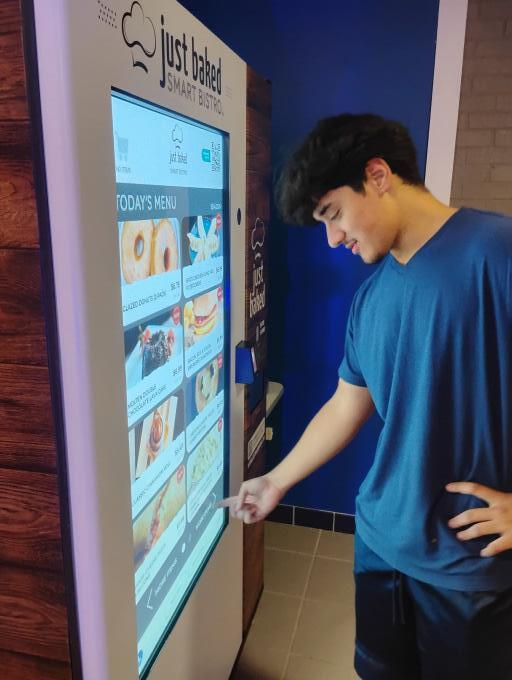
BY GRACE HARRIMAN geharriman@vwu.edu
After experiencing an uncomfortable situation at her home, Tanya Gould-Street made her way to the mall to meet a man. She began to fall in love and committed to helping him make money through an unconventional method.
Two years later, she joined the 4.5 million known victims of human trafficking in the U.S.
To spread awareness about human trafficking Virginia Wesleyan University hosted Gould and the organizations Freekind and Fear 2 Freedom for an impactful event. Freekind, a local nonprofit organization that supports victims of human trafficking and works to restore humanity within adult victims, partners with Gould to show her story.
Participants listened to “Groomed,” a 20 minute docudrama that detailed her story followed by a Q&A session with her. “I was able to find a way,” Gould said. She said the docudrama is important for every college student to watch because it gives
RANKING
CONTINUED FROM PG. 1
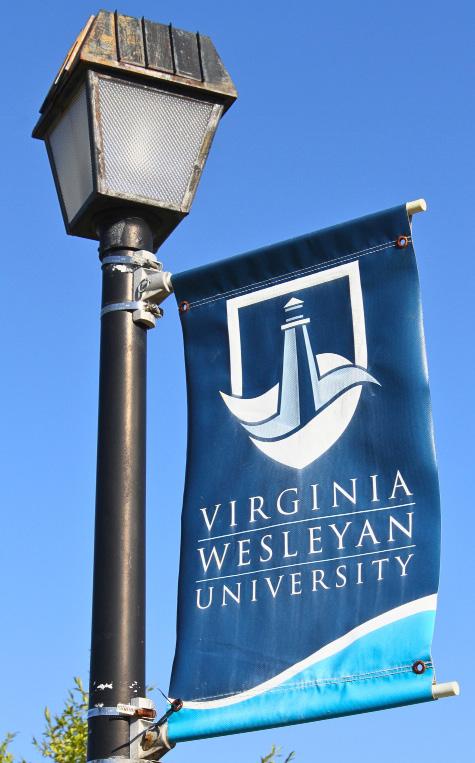
The Pell grant portion of the score is negative when the grant recipients have a lower graduation rate than their non grant peers.
Virginia Wesleyan University has a score of -10% in this category.
The research ranking in the Washington Monthly is determined through the amount of alumni that go on to receive a doctorate in proportion to the size of the institution and the money spent on research.
National Universities have more categories that are included in the ranks, like the number of engineering and science doctorates, as such the liberal arts research scores are much more focused on eventual doctorate attainment to the point of being
those being trafficked hope and shows others how traffickers are masterminds of control and manipulation. She said people saw her being trafficked but didn't do anything.
"We need to talk about these things."
Elliot Fylstra
Her mission is to spread awareness across the U.S., specifically on college campuses in Virginia. Once individuals turn 18, they must report human trafficking themself. Incidents are unreported because of fears of losing scholarships and because others don’t know how to assist them.
She said she wants victims to be “empowered to self-disclose.” Victims that self-disclose have many different options and organizations to provide them
60% of the research score.
Not every bachelor degree has a doctorate. For example, business degrees generally terminate with a master’s degree. Business is the most common major at Virginia Wesleyan.
The Princeton Review also releases a book with the 390 colleges broken down into lists of the top 50 in various categories, including best colleges for various degrees.
The overall list of 390 institutions is available online through the Princeton Review’s website and the top 50 lists for degrees are available though the book and requires a purchase to access, though there are free lists that can be accessed on the website.
These lists include social life metrics, like substance use, and the lists have distinctive names.
For example, the rankings of schools with the most and least marijuana use are named “Reefer Madness” and “Pot’s Not Hot” respectively. Virginia Wesleyan did not place on either of these rankings.
The Princeton Review has profiles on many colleges and
aftercare kits and support.
Fear 2 Freedom is one organization whose mission is to restore hope to sexual assault victims. One of the ways they do this is through their AfterCare kits and iCare kits which are provided to sexual assault victims everywhere and specifically at the hospital after physical evidence is collected.
AfterCare kits are designated for those going through a physical examination. They are packed with clean clothes, toiletries, coloring supplies, resource cards, handwritten notes and most notably a Freedom Bear.
The Freedom Bear is a project that the founder of Fear 2 Freedom, Rosemary Trible and Molly, a 7-year-old survivor created in collaboration with hospitals to create therapeutic recovery methods.
The bear features a backpack containing dissolvable paper on which survivors can write down words of healing. These papers can then be placed in the bear's secret compartment. When survivors are ready to heal, they take the paper out and
universities that are informed by the same metrics as their rankings, student surveys.
Virginia Wesleyan University’s profile is split into three categories: academics, student body and campus life.
The review is interspersed with quotes from students about the institution. The small class size and personability of the professors were noted as being some of the university’s most attractive academic features.
The student body section of VWU’s profile emphasizes the respect people have for each other and the wide variety of cultural events that are held on campus.
“I like how everyone is really interacting with each other,” Amari Rose, a nursing major and freshman said.
The campus life portion advertises the friendly cohorts of students at the university along with a lively roster of activities.
There’s still more interest in events on campus. “I say more things,” Thornton said.
In the past, VWU has also been ranked among The Princeton Review’s “The Best 389 Colleges: 2024 Edition.”
dissolve it in water.
Judah King, senior, a participant of the event, said the backstory of the bears was devastating to hear but serves as a beautiful tool to aid in the healing process. Participants of the event spent time packing each kit and writing notes which are later being delivered by Freekind. Elliot Fylstra, a sophomore and Wesleyan Engaged student worker, has the task of helping to put on and attend many community events on campus. “We need to talk about these things,” Fylstra said. They added that of the many events they have helped with this one was the most impactful and informative one.
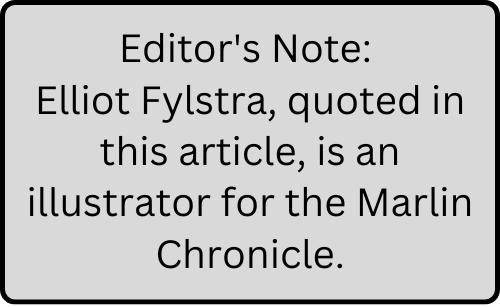
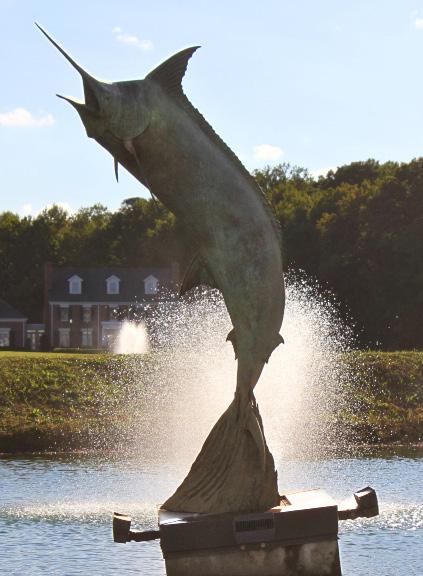

4
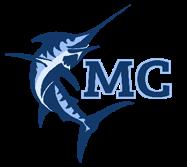
Editor-in-Chief
Victoria Haneline vfhaneline1@vwu.edu
Managing Editor
Sydnee Washington sawashington2@vwu.edu
News Editor
Isaac Fick
ihfick@vwu.edu
Community Editor
Aiden Croghan accroghan@vwu.edu
Opinions Editor
MJ Matthews mjmatthews@vwu.edu
Sports Editors
Coy Camiscioli clcamiscioli@vwu.edu
Sydnee Washington sawashington2@vwu.edu
Weekender Editor
Calee Lukowski crlukowski@vwu.edu
Photo Editor
Mckenna Howenstine mrhowenstine@vwu.edu
Illustrations Editor
Mars Johnson ibjohnson@vwu.edu
Online Editor
Josue Maradiaga jmmaradiaga@vwu.edu
Copy Editors
Kirkland Butler kwbutler@vwu.edu
MK Morris Larkin mmorrislarkin@vwu.edu
Elena Lichtenwalner eclichtenwalner@vwu. edu
Engagement Editor
Isabella Grosswiler idgrosswiler@vwu.edu
Marketing Directors
Andrew Steiner alsteiner1@vwu.edu
Advisor
Dr. Lisa Lyon Payne lpayne@vwu.edu
CONTINUED FROM PG. 1
cultural phenomenon of the jazz age where everything from cross-dressing to undressing was shown on stage. And rather than a traditional theatrical show, which follows a clear narrative with songs that add upon that story, “Chicago” incorporates another hallmark of vaudeville: a varied, more split narrative.
“Almost the whole half of the first act is character after character introducing themselves to the audience through a song,” Malone said. He explained how vaudeville and burlesque shows are comprised of multiple acts that didn’t necessarily connect, and that “Chicago” follows that style.
“These are all different kinds of acts, but in some respect, we get pulled into the narrative of the story,” Malone said.
Indeed, almost every song in “Chicago” was introduced by one of the many vibrant characters dressed in tight, glitzy outfits or even by the conductor of the live orchestral pit.
“I’ve never been to a school production with a live band,” sophomomore Madeline Diaz said.
“That was really cool.”
The orchestral pit, led by conductor Ajee Church, was a mix of VWU students and community members who played
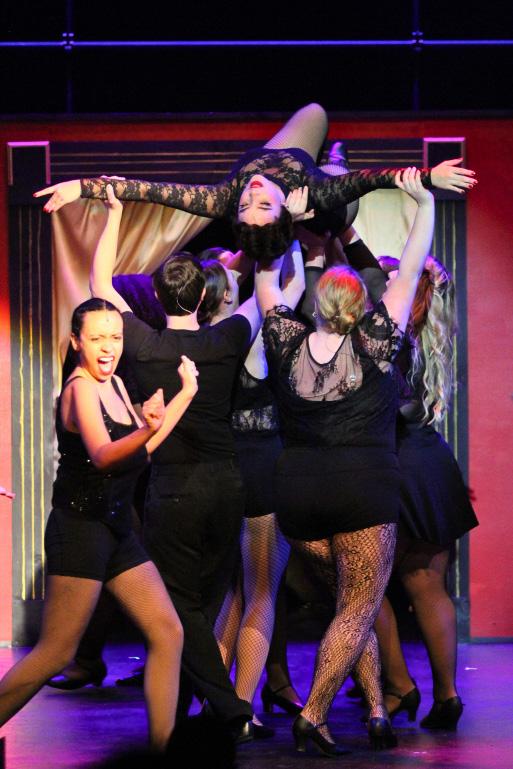
“I’ve never had an experience like this.”
Stephanie Clark
live accompaniments for the show. This was another part of the unique experiences of bringing “Chicago” to VWU that both Malone and Clark spoke to.
“I’ve never had an experience like this,” Clark said. “I’ve never performed with live music or practiced on a stage for most of the time.”
“This is one of our more challenging productions we’ve taken on. It’s the biggest production in the shortest amount
of time,” Malone said. The open call casting for “Chicago” took place Aug. 28 and 29, leaving roughly four and a half weeks to prepare and produce the show.
In order for the show to be a success, the cast committed to an intensive rehearsal schedule.
“We have amazing, amazing actors that are really crushing it right now,” Malone said. “They come in ready to work, ready to embrace the process and ready to put on a good show for everyone.”
Clark echoed his sentiments.
“I really do like this cast, because they’re all professional, and they take their job seriously,” Clark said. Clark stated her appreciation for both the cast and crew for their commitment and dedication to the show, while also still having fun.
This was Clark’s first major production with the VWU theatre department, although she has several years of acting experience within her own community. Last spring, Clark was also a part of a student-directed production at VWU. She described the difference between previous productions and “Chicago” as having more collaborative influence.
“I think he’s really a good director because he kind of gives you an idea,” Clark said, in reference to Malone.
She stated that he gave her ideas and let her have more creative control over her character, and she
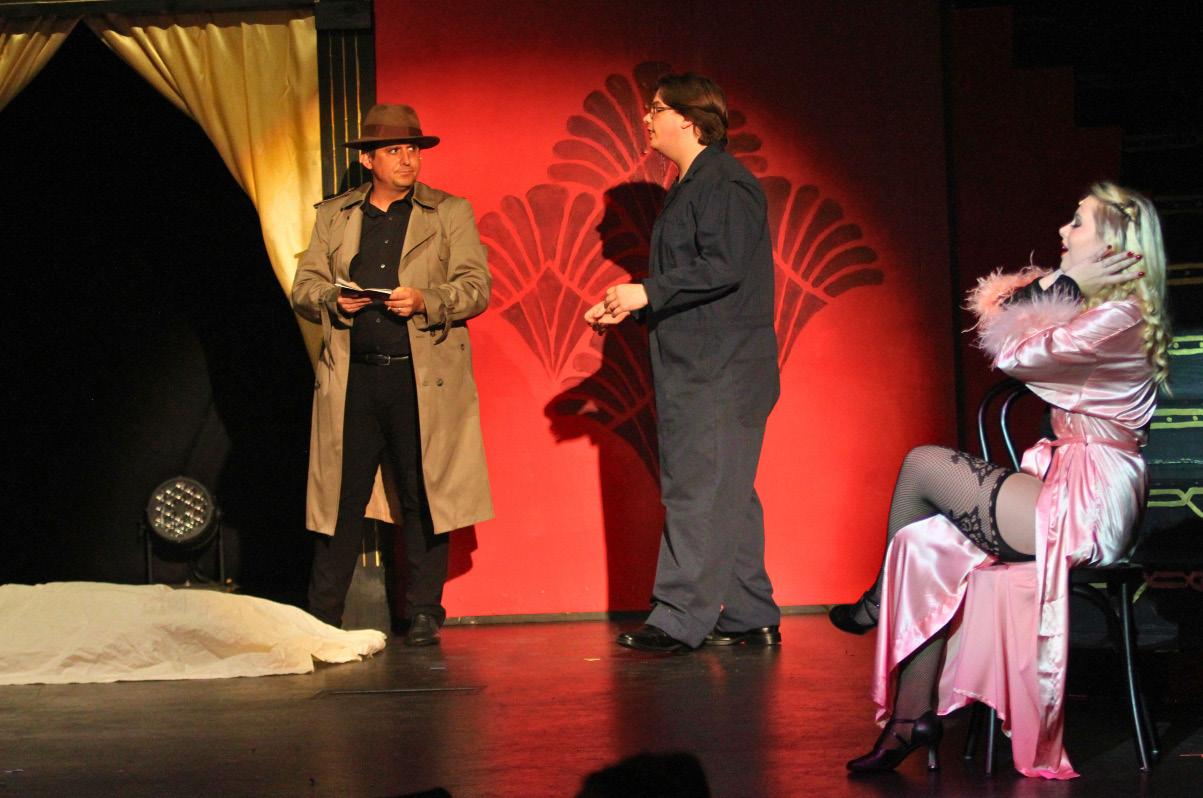


likes working with him.
“I think it takes a special approach to acting in a musical that is different than ‘Anastasia’, so that then gives [the cast] a chance to sort of really, really think about acting and performance,” Malone said.
On opening night, the Goode Center was filled with students, faculty, family members and more who excitedly watched the two and a half hour production.
“This is the first school production I’ve ever seen,” Diaz said. “I’m glad I came out tonight.”
Miguel Hernandez, a senior, agreed with Diaz’s statements.
“They had a lot of passion,” Hernandez said. “I can really tell that they’ve been working hard.”
Both Diaz and Hernandez watched “Chicago” mainly to support their friends in the cast, but said that they enjoyed the show. The 18-person cast’s hard work paid off, bringing a lively, exciting production with cultural value to VWU for the 2024 Homecoming Weekend.
“The audience loves her,” the ensemble sang, surrounding Clark near the end of Act I as she performed the song “Roxie.”
“And I love the audience” Clark sang, sashaying across the edge of the stage and waving to the audience. The cheered response seemed to agree as she continued the verse, ending with a smirk while saying,
“And that’s show biz, kid.”
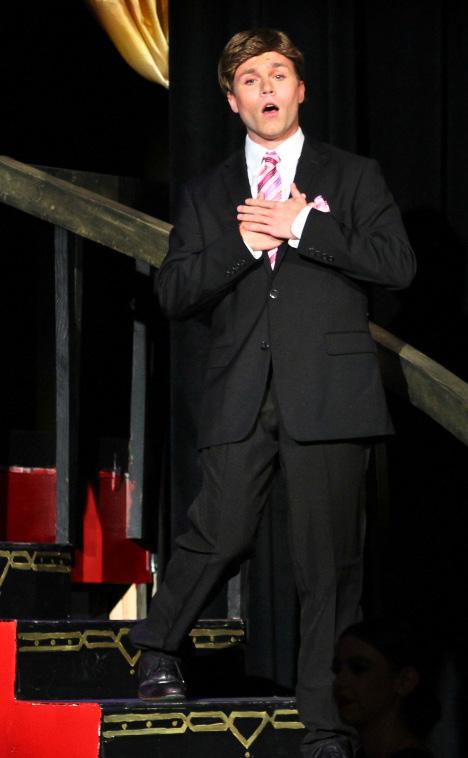
BY AIDEN CROGHAN accroghan@vwu.edu
Colleges are often seen as bastions of political engagement, but according to the Pew Research Center, voters between 18 and 29 only accounted for 11% of the voting population in 2018 and 2022. Students on the Virginia Wesleyan campus held similar conflicting views on civic engagement, some believing in the importance of voting, while others plan to abstain.
Avery Lewis, a sophomore, emphasized the importance of voting, saying, “I believe it’s important to vote, just so that everyone’s voice is heard. That’s the only way change is going to be made, is if people get out and actually vote.”
Lewis explained some issues that made voting important to her including women’s reproductive rights, climate change and samesex marriage. “Stuff like that, stuff that could affect me, my friends, my family and a lot of future generations to come,” Lewis said, explaining why these issues were so important to her.
Lewis also explained that if she could make any change to voting in the country, she would get rid of the Electoral College.
Daquan Smith, also a sophomore, explained that he planned to vote, saying, “I feel like it’s my place to vote for our country.”
“I feel like everybody chipping in, knowing what we need to do for our country is important. So I feel like knowing where to put that trust in a person kind of matters because the country is not where it should be,” Smith said, explaining why he believes it’s important to vote.
Kaitlyn Duswalt, a senior, had conflicted views on the election, saying that she didn’t plan on voting because, “I feel like my vote wouldn’t really matter too much for the outcome.”
“I feel like the two-party system makes it really hard to vote. I feel like there’s two extremes and I think, at least from what I’m hearing from both sides, I don’t identify with either,” Duswalt said.
Christopher Mercer-Garrett is a sophomore and the leader of the Young Democrats
organization on campus. Mercer-Garrett and the Young Democrats are planning an event for later this month on voting. “It’ll be giving students the opportunity to look at a pamphlet, get some more information about us, but also the pamphlet includes how to register to vote, how to make a plan, things of that nature,” Mercer-Garrett said.
“I feel like everybody chipping in, knowing what we need to do for our country is important. So I feel like knowing where to put that trust in a person kind of matters because the country is not where it should be.”
Daquan Smith
When asked about important issues for his vote, Mercer-Garrett said, “Reproductive rights for me is going to be important, because my mom had a lot of complications when she had my sister, including almost dying due to the lack of one thing, transparency between doctors, certain standards weren’t met.”
“She didn’t even have an abortion and there were still limitations after the fact, like she wanted to have her tubes tied for the simple reason that if she was to have a child again she would definitely die, and that elective surgery took about a year just to plan,” Mercer-Garrett said. “I’m not just gonna say it’s important to vote,
but it’s about knowing the candidates and what their policy is, and that comes with research before voting,” Mercer-Garret said.
“When we talk about telling someone to just vote, it’s dangerous to tell someone to just vote and they vote for someone who either doesn’t fit their needs or they’re just doing whatever’s easiest, and the thing is, when it comes down to voting, it’s important to understand that it’s nobody’s business to know who you voted for, whether it’s your friends, your family, that’s no one’s business,” Mercer-Garrett said.
The Young Democrats will be tabling on Oct. 16 at noon in the Batten Center. Students can register to vote at vote.gov or in the Wesleyan Engaged Office. If you register to vote in your
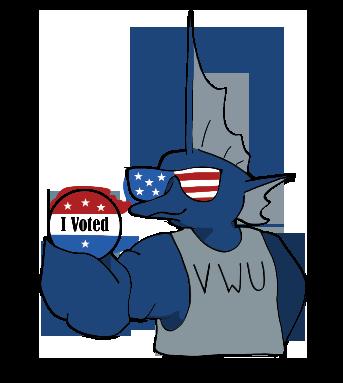
Michelle De Rosa is the new director of counseling, following previous Director April Christman’s departure from the position
BY KAMI WHISENHUNT
Michelle De Rosa, a former counseling intern in 2018, returned to campus this September as the new director of Counseling and Student Health. Since her internship, De Rosa said her dream job has been to work with the demographic of college students. Now given that opportunity she said she is striving to recreate the same space and community she benefited from as an intern.
“When I was an intern here the community was so supportive, through the students, the vibes of campus, and the progressiveness, it just really allowed me to grow into the person and clinician I am,” De Rosa said.
De Rosa received her Bachelor of Psychology at Dallas Baptist University and Master of Clinical Mental Health Counseling at Regent University, along with earning her National Certified Counselor license. De Rosa is licensed to provide clinical mental health counseling
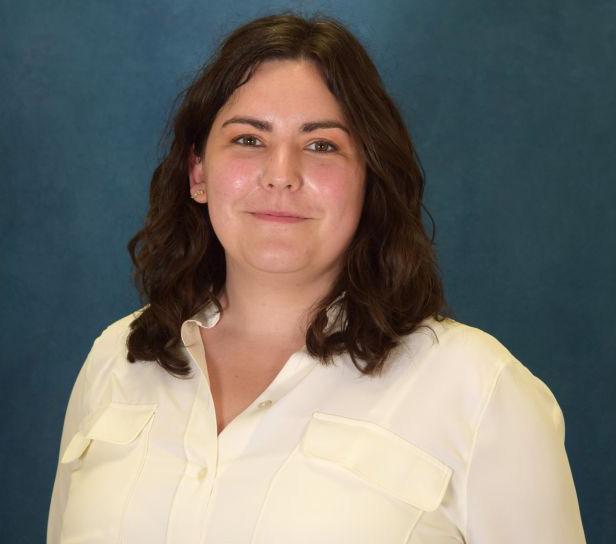
in the states of Virginia and Maryland.
After De Rosa’s internship, she worked as a counselor for a private practice called Integrative Counseling and Wellness. Continuing on her journey as a clinician, De Rosa started her own practice, which she still owns, called Pathway Psychotherapy. It includes specializations in trauma, anxiety, OCD, chronic illness, disability and neurodivergent communities. Her experience within these fields can be transferred over to help create a safe, helpful and supportive environment for students.
Laura Patrick, a counselor in student services, described De Rosa as being “passionate about creating a space that is welcoming, inclusive, and uses evidencebased treatments to serve students.”
De Rosa said coming into this position has been a full circle moment for her. She wants the counseling center to be a place where individuals can allow their own personal identities to shine through, an aspect she was grateful for during her time on campus. She wants to create this space not only for students, but for interns, new therapists and new social workers.
With De Rosa taking this position, some smaller adjustments that come along with the switching of directors in general may come up.
“I think any director is gonna have their own flair, their own style, just their own identity. So there might be some changes to just the vibes and feel of the counseling center,” De Rosa said.
Patrick expressed what she is looking forward to with this change.
“It is always great to have a fresh
set of eyes on the team to find areas of improvement,” Patrick said.
De Rosa said she will be bringing more events to the student body, geared toward different demographics.
April Christman, former director of Counseling and Student Health, offered some perspective on opportunities to reach students, including hosting events.
“When it comes to serving our VWU student community, I encourage her to have fun and spend time with the students, particularly outside of the therapy room,” Christman said. “Engaging the students in the campus community is a great way to build that trusting and supportive relationship with the student body.”
De Rosa is also committed to leaning into student voices. She is looking to update the “Zen Zone,” which is a space located in student services where students can stop by to relax when things get a little
“I want the counseling center to be a resource and support for students the way that I would have wanted when I was in undergrad, it would have made such a difference in my life”
stressful. It has bean bag chairs, lights, relaxing music and some fidget toys. De Rosa is considering surveying students on what they would like to see come into this space to make sure it is comforting and inclusive. She wants students to feel free to stop in when they need to take a break, or just want to get comfortable with the office space and staff.
“I want the counseling center to be a resource and support for students the way that I would have wanted when I was in undergrad, it would have made such a difference in my life,” De Rosa said.
As De Rosa works towards making student services more welcoming, she gave her advice to students who may be nervous about utilizing available counseling services.
“It is what you make it. So there’s no expectation to have it look a certain way. There’s no homework here, so it really is just kind of low key,” De Rosa said. De Rosa spoke highly of the counselors in student services who are always available to help, meaning students can make appointments with them as needed.
“We’ve got some really great providers here who are learning alongside you, but also just have a huge heart for supporting you and whatever you may be going through,” De Rosa said.
De Rosa is working hard to ensure students feel the student services office is a safe space they can visit when they need to talk, are looking for guidance or need a place to relax. De Rosa said herself and the counseling services staff are ready to work with and support the student body, however that may look.
Virginia Wesleyan uses ProcellaCOR, an FDA “reduced risk” algicidal dye, to give campus ponds their blue hue and to prevent harmful algae growth.
BY VICTORIA HANELINE vfhaneline1@vwu.edu
Virginia Wesleyan University dyes almost all of the ponds blue, and they have been doing this for a long time. The pond management contractor, Solitude Lake Management, uses ProcellaCOR, a dye that was first used in VWU water in 2017 and has an algicidal active ingredient, florpyrauxifen-benzyl.
“This has been part of pond management 101 for years,” Jason Seward, associate vice president for Campus Life and Operational Management, said. He said it was “not at all” dangerous.
The EPA has registered florpyrauxifenbenzyl as “reduced risk,” which means it is less toxic than existing registered alternatives. There are no restrictions on fishing, drinking or recreation activities in water treated with ProcellaCOR. The algicide florpyrauxifen-benzyl is an organic molecule and has a formula of C20H14Cl2F2N2O3. It contains two fluorinated carbons, which can be seen in the C-F bonds on the diagram, but the compound is not a PFAS (often known as “forever chemicals”) according to the EPA and most definitions, which require a chain of fluorinated carbons.
“There are many benefits to pond dying—you can do a quick google search,” Seward said.
A study by Alisha Davidson, funded by the Great Lakes Aquatic Research and Management, found that florpyrauxifenbenzyl was effective at treating lakes for Eurasian milfoil (Myriophyllum spicatum), a common invasive species. Mean species richness (biodiversity and the health of the ecosystem) increased after treatment. Other studies showed similar results and little to no effect on wildlife, although the chemical has yet to undergo rigorous testing on a broad scale.
The lakes at Virginia Wesleyan are BMPs, or Best Management Practices, according to Seward. The lakes serve the function of absorbing stormwater runoff and increasing healthy percolation over storm drains.
Marco Molino, a senior Biology major, studied heavy metal pollution in lakes on
“This has been part of pond management 101 for years.”
Jason Seward, Associate Vice President for Campus Life and Operational Management
campus fall of 2023. He found an increase in copper and chromium concentrations in the “fountain ponds” over the retention ponds by Greer, “Copper specifically.” There was a “pretty distinct difference” between the two systems. He said one cause might be algicides containing copper, which is harmful to marine life. ProcellaCOR does not contain copper. The retention ponds are managed by Norfolk Botanical Gardens and do not use dye.
Seward said that the school has been contracting with Solitude “as long as I can remember,” at least since 2017 and probably “further back than that.” The Marlin Chronicle attempted to contact Solitude via phone, but the representative was unaware of the treatment that Solitude used before ProcellaCOR, which was classified by the FDA as “reduced risk” in 2017. In any case, it is very unlikely for copper treatments from seven years ago to be affecting copper levels. The levels are likely due to some other cause.
“I have not yet heard of any problem [with using pond treatments]”, Dr. Maynard Schaus, professor of Biology and Environmental Science and the coordinator of Sustainability Management, said. He sent the Marlin Chronicle several research articles on pond dye (specifically Aquashade, which has no algicidal component beyond darkening the water to impede photosynthesis) and copper treatments. These articles supported his position, as did research done by

the Chronicle, which found conflicting positions but no significant evidence that ProcellaCOR was harmful.
“It’s an environmentally friendly product, because that’s important to us,” Seward said. Virginia Wesleyan has a commitment to sustainability that can be seen in the Green Environmental Center and the natural garden surrounding it.
In addition to the ProcellaCOR, the school takes other measures for pond health. Fountains, which are often seen as purely aesthetic, contribute to aeration or introducing air into the lake. This process can be accomplished by other ways, but “most people just put in a fountain because it looks pretty,” Schaus said.
This mirroring of aesthetics and lake treatment is expressly part of the process. Seward mentioned on multiple occasions that the dye was “more aesthetically pleasing.” He made a point to say that a blue lake is both prettier and more environmentally friendly than a lake covered with a green film and no fish, which would likely happen were algae to be allowed to grow out of control.
Since the lakes “absorb excess stormwater,” Schaus said, it is often “easier to just manage it with Aquashade.” The lakes’ function as BMPs could reasonably necessitate treatment and introduce difficulties in managing it naturally.
“The active use of algaecide is always going to be less perfect than finding ecological balance, like in the retention ponds,” Molino said. He said that a possible contributor to the necessity of algaecide would be the grass monoculture surrounding the lakes, as opposed to the retention ponds having native plants. He said he was “always a proponent of reducing monocultures.”
In a healthy, non-monoculture environment, “nutrient balance tends to
self-equalize,” Molino said.
Even in healthy environments, many large lakes suffer incursions of algae, often to a much greater detriment than using pond dye might cause.
A study by Lamb et al. called “Monitoring and water quality impacts of an herbicide treatment on an aquatic invasive plant in a drinking water reservoir” found that ProcellaCOR reduced coverage of Yellow Floating Heart (Nymphoides peltata) substantially in a drinking water reservoir in Stillwater, OK.
Pond dye is often used for aesthetic purposes, and is likely to be unpopular among environmental proponents. Molino objected to it “on principle.” There are certainly alternatives, such as those used in the Greer retention ponds, which do not involve pond dye, although they might be unsuitable for the larger BMP lakes on campus. In any case, existing research shows that ProcellaCOR causes little harm and is almost certainly better than algae blooms.
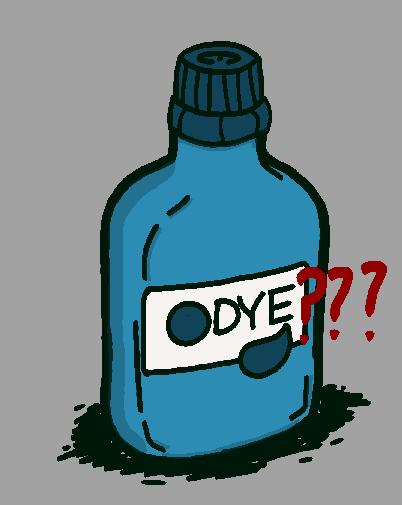

BY ANDREW STEINER alsteiner1@vwu.edu
Andrew is a junior studying Political Science. He is the Marketing Director for Marlin Chronicle.
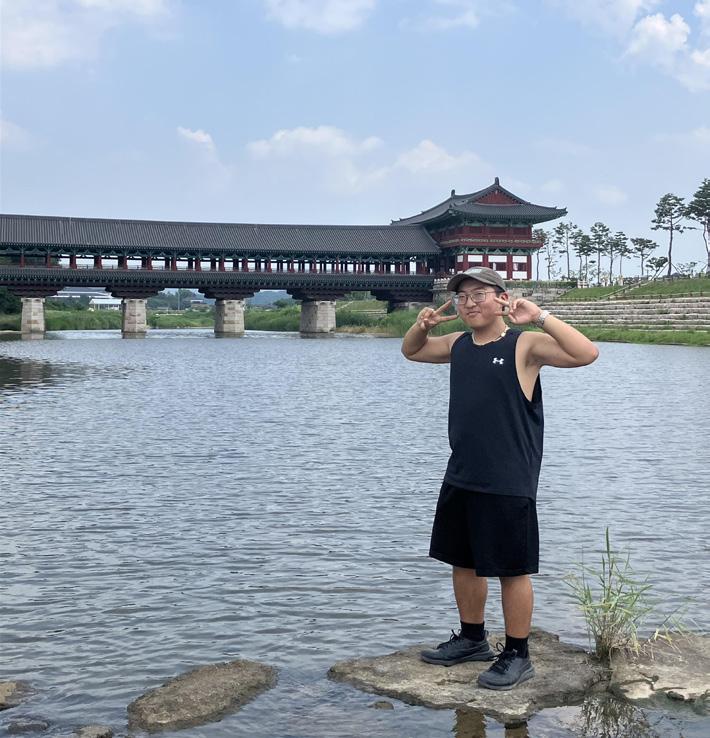
In high school, I had little opportunity to travel internationally, so the chance to spend a full semester abroad was immensely appealing. Additionally, as an international adoptee, I have always been eager to learn about the culture that I was born into but not raised. Thus, a robust Study Abroad program was a significant factor in my decision to attend both Virginia Wesleyan University and the Batten Honors College.
A year ago, I began the Study Abroad application process, going through the Lighthouse’s Global Scholars program and then applying to International Student Exchange Programs (ISEP) for school placement. Ultimately, I spent the entirety of the Spring 2024 semester abroad in
South Korea. If you’ve never heard of ISEP, they’re an organization that partners with hundreds of colleges and universities worldwide to create study abroad experiences. With minor exceptions, VWU students must go through ISEP in order to study abroad.
I feel compelled to note that ISEP is helpful in many ways, including their publication of comprehensive health and safety data. My semester at Keimyung University was perhaps the highlight of my college career thus far, and I gained knowledge and experienced character growth far beyond the classroom. Some of the relationships formed while abroad will remain with me for the rest of my life.
With that being said, ISEP does have several flaws, and I believe that VWU could both acknowledge these and minimize their impact on students.
One of the most pressing issues faced by students is college’s financial cost.
Between tuition, housing and various fees foisted on students, attending VWU might cost anywhere from 22 to 30 thousand dollars per semester. While grants and scholarships help alleviate this burden, nearly every student must carefully budget their finances and navigate tough work schedules to afford university. When I was applying to study abroad, I was informed that ISEP would charge me approximately $500 solely for application and acceptance to an international university and another $500 for ISEP’s health insurance policy, which couldn’t be waived.
My issue is not with ISEP’s fees; after all, they incur costs as well. The problem
here is that these are not advertised by Virginia Wesleyan until after a student starts searching for schools through ISEP. In fact, the VWU website does not inform students of the upfront cost of any of its Study Abroad or Study Away courses, which might mislead students into believing that the university is covering them. Being upfront with this information would demonstrate honesty with students, especially for a school that advertises that 25% of its students are first generation.
On a similar note, the mandatory ISEP insurance poses problems for those studying abroad in countries that also mandate a national health insurance for foreign students. One such country is South Korea, which charges $50 to $70 a month for their National Health Insurance Service (NHIS). While the NHIS can be waived with proof of adequate insurance, gaining an exemption required multiple trips to an NHIS office and numerous phone calls with often unreachable ISEP coordinators. Since NHIS coverage is retroactive, I believe it would be far fairer for ISEP to alter their insurance requirement for students traveling to countries with applicable NHIS policies. As an institutional ISEP partner, VWU could advocate for this change that would save its students time, money and anxiety.
Another problem that I faced was the clear lack of communication between ISEP and VWU personnel that translated to poor communication with students abroad. During the four months I was abroad, I received several monthly emails from my ISEP coordinator, which
would be sufficient except nearly all were answers to my own inquiries or email-list invitations to events. I was never contacted by Amanda Reinig, then VWU’s Global Engagement director. Other students who went abroad have had similar experiences. This doesn’t reflect upon the current Global Engagement Director, Brooke Novkovic, who has worked to address this problem. In fact, VWU should continue building on these efforts to provide proper ground support to Marlins abroad.
None of these problems are insurmountable, and I remain optimistic that VWU and ISEP can address these flaws. By informing students of the cost of Studying Away or Abroad, Virginia Wesleyan will avoid blindsiding students with frustrating hidden fees. VWU can also demonstrate its commitment to students by advocating for changes within ISEP that will reduce confusion that interrupts otherwise life-changing experiences. Administration should also continue to support efforts to provide adequate support to currently abroad students. As VWU’s Study Abroad program expands and both sends an unprecedented number of Marlins abroad and receives numerous international and exchange students, the identification and addressal of problems that might hinder this growth should be paramount to both VWU and ISEP.
Steiner and Reslink’s articles have been abridged. View the full versions on our website.
BY LILY RESLINK lbreslink@vwu.edu
I used to live by the phrase “Do something your future self will thank you for.” I upheld that by working myself to the bone to get ahead in my professional and academic goals. I spread myself thin and left nothing in the tank for enjoyment outside of the validation received from these pursuits.
In my free time, I sat at my desk on my laptop working away. This impacted how well I took care of myself. I allowed it to cut into not only time with friends and family, but also sleep. I struggled to put my work away, and even when I did, I found it difficult to truly feel a sense of relaxation. I had convinced myself that time away from productivity was useless.
It took me too long to realize that as I lived by that mindset and maintained that discipline, I was not doing what my future self would thank me for. The inability to set boundaries in this regard can strip people of individuality, damage self-esteem and lead to burnout. Creating a healthy work-life balance is the most sustainable path to success, but achieving this can be very confusing, especially for highly ambitious people. It is not always clear what that is supposed to look like, which causes people to falsely believe they are doing just fine when, in fact, they are close to going off the deep end. It requires a lot of personal reflection for a person to determine what they actually want out of life. However, the blame for these tendencies cannot be solely placed on the individual. Many settings create a toxic culture that encourages this, making it more difficult to escape this cycle. This productivity culture often undermines the intrinsic value of humanity. Educational
Dear Editor,
This is in response to an “Diversity or lack thereof in the Batten Honors College” written by MJ Matthews, published last issue.
I have been passionate about volunteering with the Batten Honors College (BHC) since my first semester to give back to the program that provided me with many opportunities to better my professional and personal skills. Some of these unique opportunities I have taken advantage of through the BHC include attending distinguished lecturers at the Norfolk Forum, having access to internship opportunities at the International Student Exchange Program (ISEP) and studying abroad twice. All of these experiences have enabled me to grow as an individual, widening my worldview and exposing me to perspectives that differ from my own.
I have been working in the BHC Office for two years. Through this experience, I have gained insight into the processes of admission into the BHC. The BHC accepts approximately 40 students per cohort year, emphasizing the educational journey that the group will take together. These 40 students matriculate as first-year students at the beginning of their college experiences in September and will graduate together after earning their medallions at a ceremony, celebrating their completion of the program.
Beginning and completing this journey as a cohort is fundamental to the BHC.

institutions, workplaces and households need to consider whether their expectations support or hinder individual self-worth.
It is a beautiful thing to have big and bold professional goals that you can work towards. However, this should not feel like a punishment or a deprivation of personal wants. This should not come at the cost of losing the formative life experiences and quality time with others. Personal fulfillment has to come alongside professional fulfillment.
Spending my semester studying abroad in South Korea has continued to open my eyes to the importance of how I spend my time. I am surrounded by an entirely new environment to explore, and the possibilities are endless. Simultaneously, I am managing my course load,
For this reason, admitting students into the program in their second year or beyond goes against the mission of the BHC. With regards to some of the required coursework associated with the program, HON 110: Contemporary Environmental Issues and HON 210: Self & Global Leadership, are to be taken with your entire first-year cohort during a student’s first and second semesters. Not only does this allow students to bond with their peers, but it also prepares students for the rest of their academic journey as BHC students. Any students who would enter the program at a later point would have missed out on fundamental bonding with their cohort. In terms of equity, it is unfair to the students who are already in the program for students to be welcomed to the BHC as second-year students. The BHC holds three in-person competitions during students’ senior year of high school for them to compete for and earn their spot in the program. We also offer virtual competitions for students who do not have the option to come to campus to compete. Thus, students have ample opportunities to research the program in its entirety before the final BHC application deadline, which is in February of their high school senior year. As an honors college, we expect students to be able to conduct research. When researching ‘Honors Programs in Virginia’, the BHC is the eighth link to populate; It can be argued that any student would be able to sift
endless study abroad paperwork, finances and other commitments. It is so important for me to slow down and consider whether I am living life to the fullest or running myself ragged.
Don’t spread yourself so thin that you have nothing left. If you burn yourself out, you are left without a spark. You will become a shell of a person. A long list of accomplishments does not get you as far if you have no breath remaining to share it.
Today, I still live by the phrase, “Do something your future self will thank you for,” but it means something different to me now. Our future selves will thank us for saying yes to opportunities and making memories.
Time dedicated to life outside of work and screens does not have to be time-consuming or grandiose. It can consist of a night a week set aside for a movie with a friend, or a free afternoon used to take a walk by the beach. Everyone could benefit more from thinking about what their future selves would truly thank them for.
Lily is a junior studying Media and Communication.
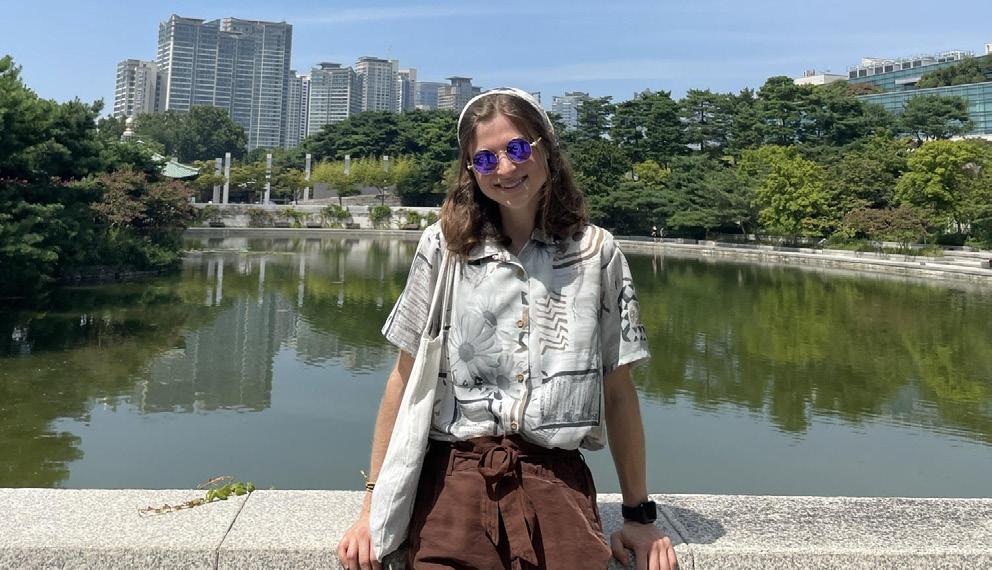
through these programs and find the BHC if they are actively searching for a college program of this nature. Especially for students who are already planning to attend VWU by January, the BHC is not hard to find on the website. Students who are accepted to VWU and qualify for the BHC based on their GPA also receive an email notifying them that they are eligible for the program and are encouraged to apply.
Any student who is faced with making the big college decision has likely viewed their college website. If you visit vwu.edu and click on the first undergraduate screen, you are immediately shown the following in the Academics Menu: “Virginia Wesleyan’s academic program is administered through the Batten Honors College, the Birdsong School of Social Science, the Joan P. Brock School of Mathematics and Natural Sciences, the Susan S. Goode School of Arts and Humanities, the D. Henry Watts School of Professional Studies, and VWU Global.” The Batten Honors College is not only the first program listed on the screen, but it also links to the program page where students can research more about the BHC.
Being a part of this BHC community is a privilege, rewarding high-achieving students with scholarships and special opportunities. In terms of marketing the BHC, of course, there is always more work to be done, but as an institution, we have not been ‘flailing’ or ‘failing’ with
recruiting students of diverse backgrounds and identities. The current BHC first-year students, the cohort of 2024, are our most diverse class of students yet, emerging from three continents. 6 of the 40 students in this cohort are from outside of the United States. The BHC consistently aims to expose students to perspectives that differ from their own because that is one of the most valuable aspects of a college education. Being surrounded by unfamiliar cultures, religions and identities in a college setting helps students to more fully develop an understanding of global citizenship.
The Batten Honors College aspires to continue building diverse student cohorts and enriching academic experiences for students. If you would like to volunteer with the BHC for recruiting events, please reach out to the Director of Enrollment, Nikki Nieves. We are actively recruiting the next cohort of Honors students. As a member of the BHC community, it is also your responsibility to spread the word and the program and help to recruit the kinds of students that you want in your living & learning community. If you know someone who is seeking to change the world and would make a great addition to the BHC community, spread the word. If you want to make a difference in who you see coming into the program, you have a role to play, too.

BY CROSSON MILLER lcmiller@vwu.edu
In his second season as the head coach of Virginia Wesleyan Men’s Soccer, Shane Kohler has the team winning at a high rate. Through their first twelve games of the season, they boast a 9-1-2 record.
“I think some of the successes is that we just came into preseason ready to go, and the guys came in prepared. We did challenge ourselves in our out of conference schedule, so we had to be good right from the start,” Kohler said.
While their present success is gratifying, the team has their eyes on what’s ahead. They look to improve upon previous years results, starting with addressing their goals.
“We talk about winning an ODAC Championship and going to the NCAA Tournament. And so for us, those are our aspirations, and we talk about it pretty frequently amongst the group. So,
I think that should be motivation enough,” Kohler said.
The team has advanced to the conference semifinals in each of the last three years, but have yet to make an appearance in the conference championship. Senior midfielder Everett McCloskey commented on the team’s aspirations this year, looking to do better.
“One of our goals for the season is to win the ODAC
“It’s a statement win to the ODAC and the rest of the country that Virginia Wesleyan University’s Men’s Soccer is a force to be reckoned with and is one of the best teams in the country.” Everett McCloskey
Championship. We’ve been close many times. So that’s the goal
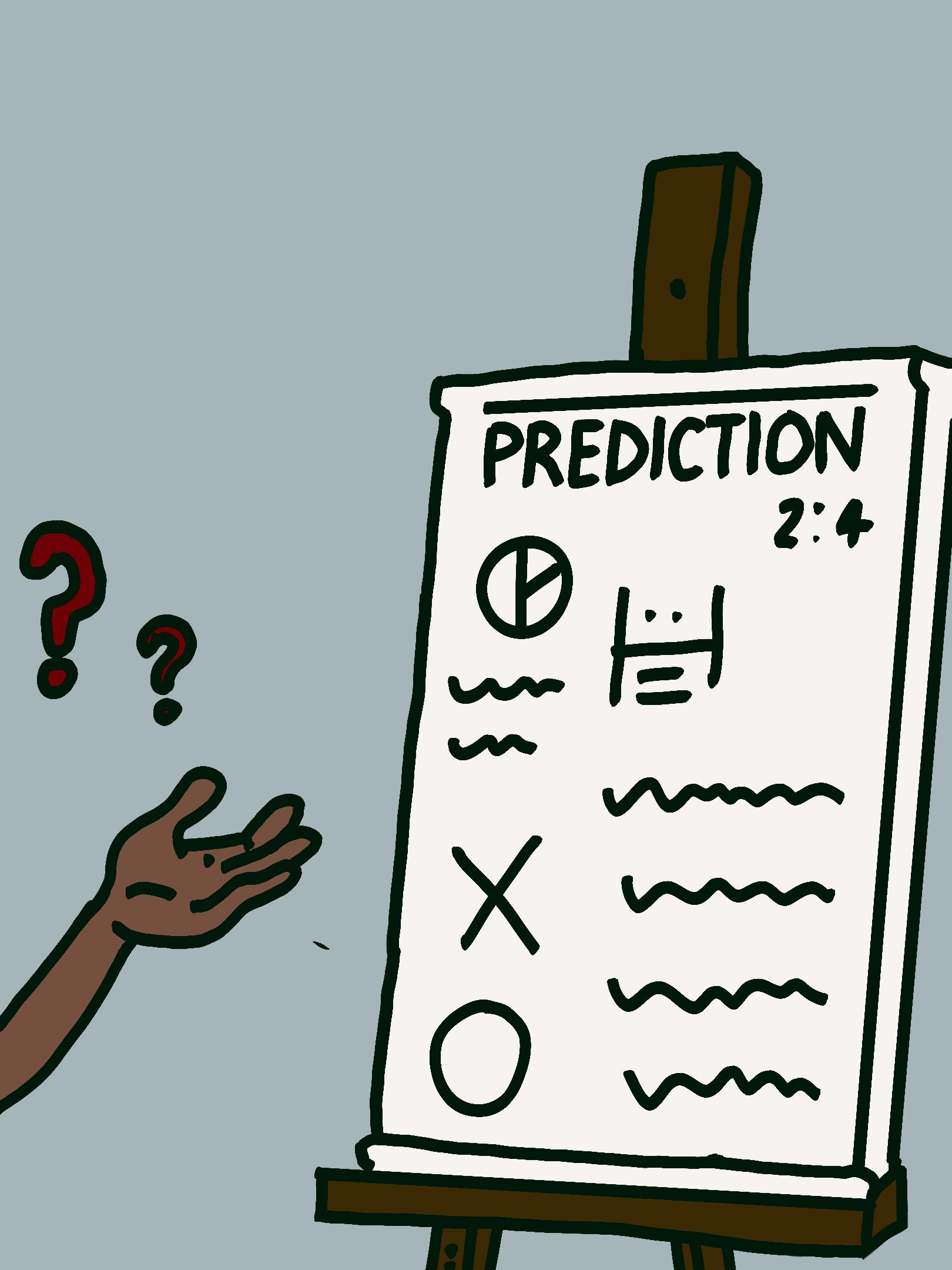
BY SYDNEE WASHINGTON
With the start of 2024 fall conference play and the wrap up of preseason play, teams are geared up with hopes of success this season. This year of play is especially exciting as it marks the end of the COVID era in which collegiate athletes were granted additional years of eligibility to compensate for the loss of gameplay as a result of restrictive protection measures. Teams that were previously stacked with graduate upperclassmen now look to their underclassmen to
step up, fostering an atmosphere of uncertainty regarding the performance of recently successful programs. Director of Athletic Communications Tyler Costello and senior VWU Sports Announcer Allyson Crothers gave their input on what to expect from the Marlins in this up and coming fall season.
For Costello, the team that stands out the most in terms of gaged success is Men’s Soccer, who went 5-1-2 in preseason. “I think Men’s Soccer had a really good start to the season. They just started their ODAC play. They had a really big win against
the Lynchburg Hornets was recognized by the conference and the NCAA. On Monday, Sept. 30, the Marlin’s sophomore goalie, Ben Haynes, was awarded with the ODAC Men’s Soccer Defensive Player of the Week.
Haynes recorded 12 saves in the shutout. As of Oct. 8, the team is recognized as the No. 15 team in the nation.
Their success has been recognized and spread throughout the school as well. Executive Director of Intercollegiate Athletics Andrea Hoover-Erbig commented on their goals and competitive efforts.
“With the results that they’re getting on the field and going a little further in the ODAC tournament, I think it’s a combination of recruiting and just building that competitive culture. Setting their goals to be successful and competitive at the end of the season,” Hoover-Erbig said.
there, and going to the NCAA tournament and just make some history,” McCloskey said.
On Saturday, Sept. 28, the Marlins played their second conference match of the season against the University of Lynchburg. This match resulted in a 2-0 win, much different from their previous meeting in the 2023 ODAC semifinal match. This result has further instilled confidence in the team.
“It’s a statement win to the ODAC and the rest of the country that Virginia Wesleyan University’s Men’s Soccer is a force to be reckoned with and is one of the best teams in the country,” McCloskey said. “We respect Lynchburg and every single ODAC school we play because we believe that the ODAC has some of the best teams in the country. This win gives us even more of a belief that we are going to make great accomplishments this year.”
The team’s success against
EMU, and they have a really big game coming up on Saturday against Lynchburg, who won the conference last year,” he said.
In the important match against Lynchburg, the Marlins bested the Hornets with a score of 2-0. Men’s Soccer features strong talent such as graduate player Alex Moody, senior Josh Condit, and sophomore JaMarhe Wills. All were named to the United Soccer Coaches (USC) AllRegion Team in the 2023 season, where the program was also awarded its first ever selection to the Eastern College Athletic Conference (ECAC) Tournament.
Costello believes the team can maintain this streak of success this season. “You have a lot of young talent in the midfield. You have a lot of young talent on defense… and they definitely have the desire to win as well.”
Costello also acknowledged the tough competition Men’s Soccer will face throughout the season; however, “if they win games that they’re supposed to win” and “put in a battle against those top teams” then they have a “really good shot” at an ODAC championship.
As for Crothers, she believes Women’s Volleyball will be particularly successful this season. “Every year I’ve been here, they have impressed me in some way, shape or form,” she said.
The team is led by graduate player Emma Claytor, who was selected to the 2023 Virginia Sports Information Directors (VaSID) All-State team and AllODAC team, and senior Hannah Smith, who was selected to the 2023 All-ODAC team as well. Both players have also received Player of the Week honors this season. Their head coach, Karissa Cumberbatch, was also voted ODAC Head Coach of the Year.
In the ODAC preseason poll, the team was projected to be number one. Currently, the Marlins are third in their conference with a record of 5-1. Earlier this season, Claytor went down with an injury. Crothers still believes the
the team still has areas in their game that they need to improve.
“I do think some of the defensive press and pressure can continue to improve. Just kind of being turned on for the entire 90 minutes. I think there are some moments where we have a letdown for a little bit, unfortunately that can cost you at the end of the game,” Kohler said.
Sophomore midfielder Joshua Nevins has been deemed a “warrior” by Coach Kohler, leading the back line. Nevins believes the team is highly motivated and tightly-knit.
“I just think our mindset is different because we have a lot of [seniors] to play for,” Nevins said. “There’s the group of guys who are boys now, so it just makes it easy to play. We’re just pumped up for every single game.”
Even with their winning record, Coach Kohler acknowledged that
With their current record, Men’s Soccer is trying to extend their season past the ODAC Tournament and into the NCAA Playoffs. Their next game is Oct. 12 at Roanoke.
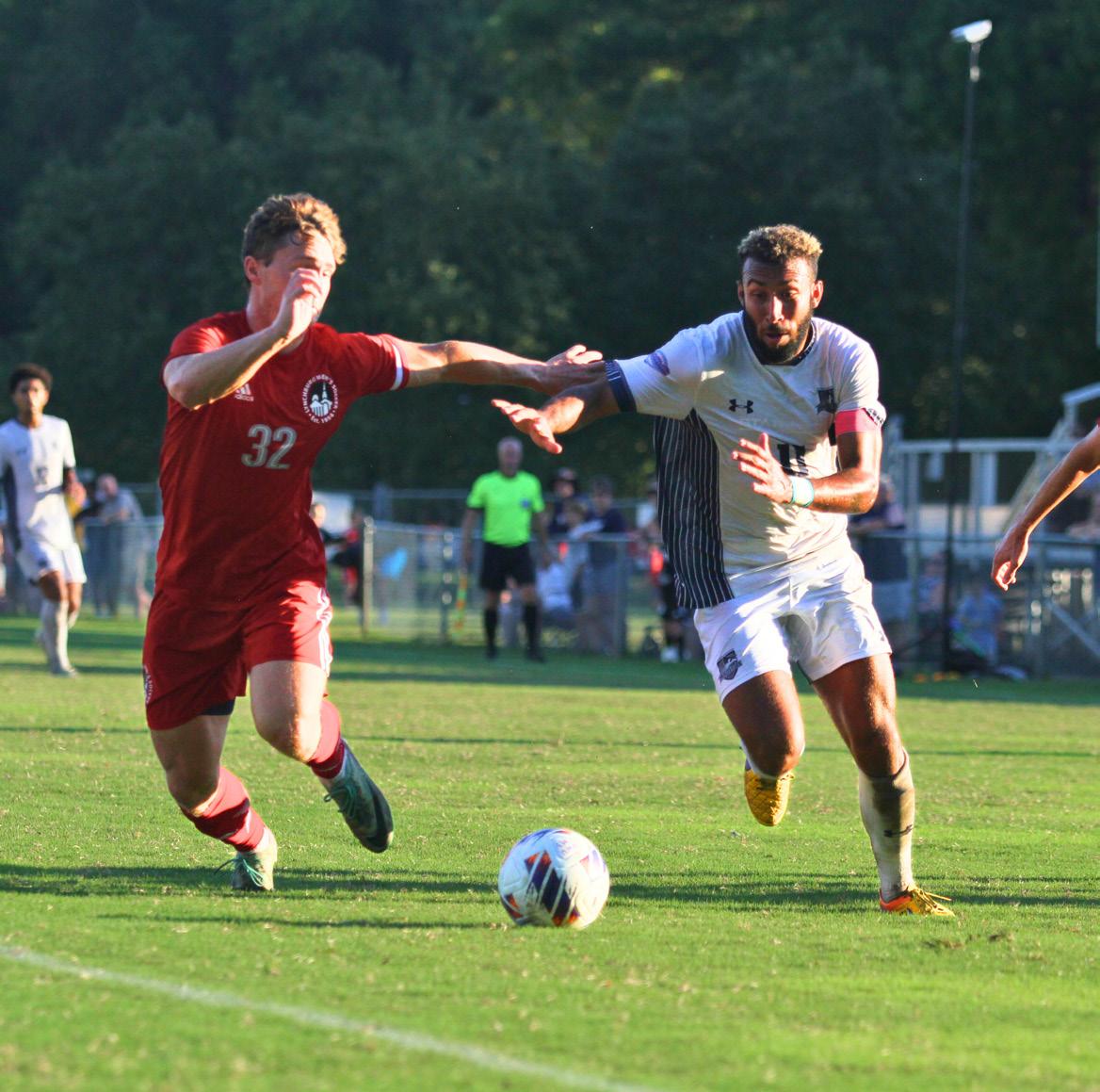
program will live up to its No. 1 projection, especially with the strength of their coaching staff.
“Their coaching staff, for me, is stellar. I think that Coach Cumberbatch, Coach Christian, they do such a good job with the girls, and I think that really pushing them past their limits is really going to be crucial,” Crothers said.
Costello agreed, citing the team’s strength in their depth even with the loss of four AllODAC seniors from last season, who spearheaded their undefeated record in conference play.
“I think they found some people to step up… Madeleine Hanes has come in and done a really good job at libero…Hannah Smith has obviously stepped up…Madi Schmidt has come in and done a lot of good…Kyleigh [Castengera]...along with Breana Brooks,” Costello said.
“I think it’s almost like the movie ‘Moneyball’, right? You’re almost never going to replace some of those seniors that were lost from last year. But, what you can do is make it up with a couple different players, which in a way almost makes you more dangerous,” Costello said.
Women’s Soccer is another program that is grappling with the loss of talented seniors. Last year, the team won their third ODAC Championship in program history and advanced to the Sweet Sixteen in the NCAA Tournament. The team was awarded a league high seven All-ODAC honors, six of which were awarded to seniors.
The program had a rocky start in preseason, going 0-3-3, though the team was facing tough competition such as Christopher Newport University, who is ranked 5 nationally.
Costello and Crothers still believe the program will live up to its 12 national ranking.
“I think that in a general sense, they do have the potential to be in their top spot again. They have a lot of great players, a lot of great potential. They just need to sort of find the flow of the game and just work together as a team,”
Crothers said.
Costello agreed and said, “[Head Coach] Jeff Bowers is a super awesome coach. He’s been doing this for over 20 years, and I think there’s still more to come for them…he’s made the NCAA Tournament the last couple of years, and he makes a tough schedule in order to get an at-large bid…so I think they played some tough competition, as I think when they get into ODAC play, maybe that’ll be the difference makers in that they’ll gain some confidence in some games.”
A team that has reversed its fortunes in recent seasons is field hockey. Last season, the team more than doubled its wins from the previous season, but was still short of a winning record and the ODAC playoffs. This season, they are on a nine game winning streak, with a conference record of 2-0 and an overall record of 10-1.
Costello and Crothers both named the program as this year’s underdog.
“[Head Coach] Ryley [van der Velde] has done an amazing job since she’s come in… her first year, she didn’t do that well. Last year was definitely a step in the right direction… and this year, she’s seven and one already. So that’s huge. I’m not sure about, you know, the rest of the ODAC if they’re looking at her and going, oh my gosh, maybe underestimated her. But I think she’s super excited,” he said. For Crothers, field hockey is an “often overlooked” program that has “started to grow into a team and really work together”.
Regardless of a team’s success in preseason, what matters is their performance in conference, according to Costello.
“All the teams are starting to get into ODAC play soon. So I think that’ll be the real test… the ODAC is probably one of the toughest conferences in the nation for a lot of different sports,” he said.
Follow the Marlins to see if they hold up to the test of conference play.
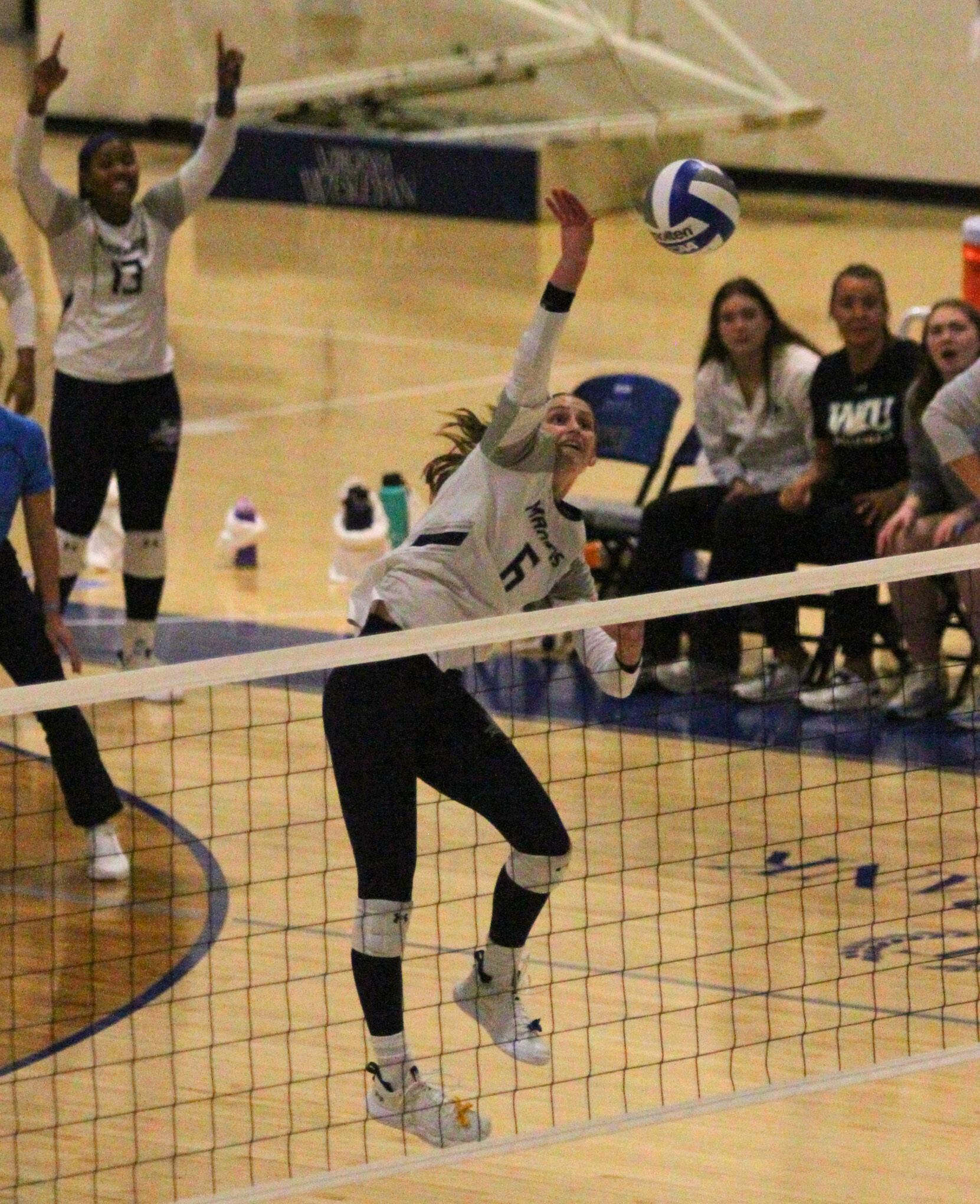
In the first meeting of the season with conference opponent Ferrum College, senior outside hitter Hannah Smith recorded a career and program high: 28 kills in a single game. This new program record edged out the 27 kills game high previously held by VWU Athletic Hall of Famer Kala Guy.
Smith, who has also collected two ODAC Offensive Player of the Week honors, credited her success this season to her hard work and dedication in the offseason. “I worked really hard in the offseason, over the summer, to get where I am today. I went to this personal trainer almost every day over the summer to get right, and I think that really improved my vertical and my touch, just overall, and my strength,” she said. “The support from Coach K and my teammates also really helped. Just the environment as a whole.”
Smith also noted the key to maintaining this high level of play lies in her humility as well.
“I like to keep myself humbled a little bit just so I don’t get a big head or anything. I like to just play my game, and I think having confidence is key to make you a good player, but you definitely do need to stay a little humbled,” she said.
This season, the program suffered a big loss with the injury of graduate middle blocker Emma Claytor who swept the Offensive and Defensive Player of the Week awards with Smith in early September. Recognizing this sizable loss, Smith has stepped up her game to fill her teammates shoes.
“Ever since Emma got hurt–because Emma was a big part of the team and really, offensively and defensively, had our stats up on a high–I really had to step up and pick up that position that Emma had,” she said. “I changed my mindset… I now have to be the person that they can trust to put a ball away.”
The team is currently third in ODAC Conference standings. Last year, the team went undefeated, earning the title of ODAC Regular Season Champions. Despite this dominance, the team fell to Washington & Lee in the postseason. This year, Smith looks to beat the odds with consistency.
“I think last year we did so well in the season and then like mentally and physically decreased towards the end of the season, so I think just constantly being at an increase, taking care of our bodies and our minds, that way we are all in the same mindset to where we can really just hit our peak at the end of the season.”
To ensure this consistency, Smith emphasizes team accountability.
“I definitely am a very competitive person, and I hold everyone to that same standard,” she said. “I’m very straightforward and blunt...I say what needs to be said and how it needs to be said to get us to where we need to be because I want to win, and I know everyone else wants to win.”
With confidence, humility and dedication, Smith leads the Marlins as they look to bring home the program’s second ODAC Championship– the last being in 2019.
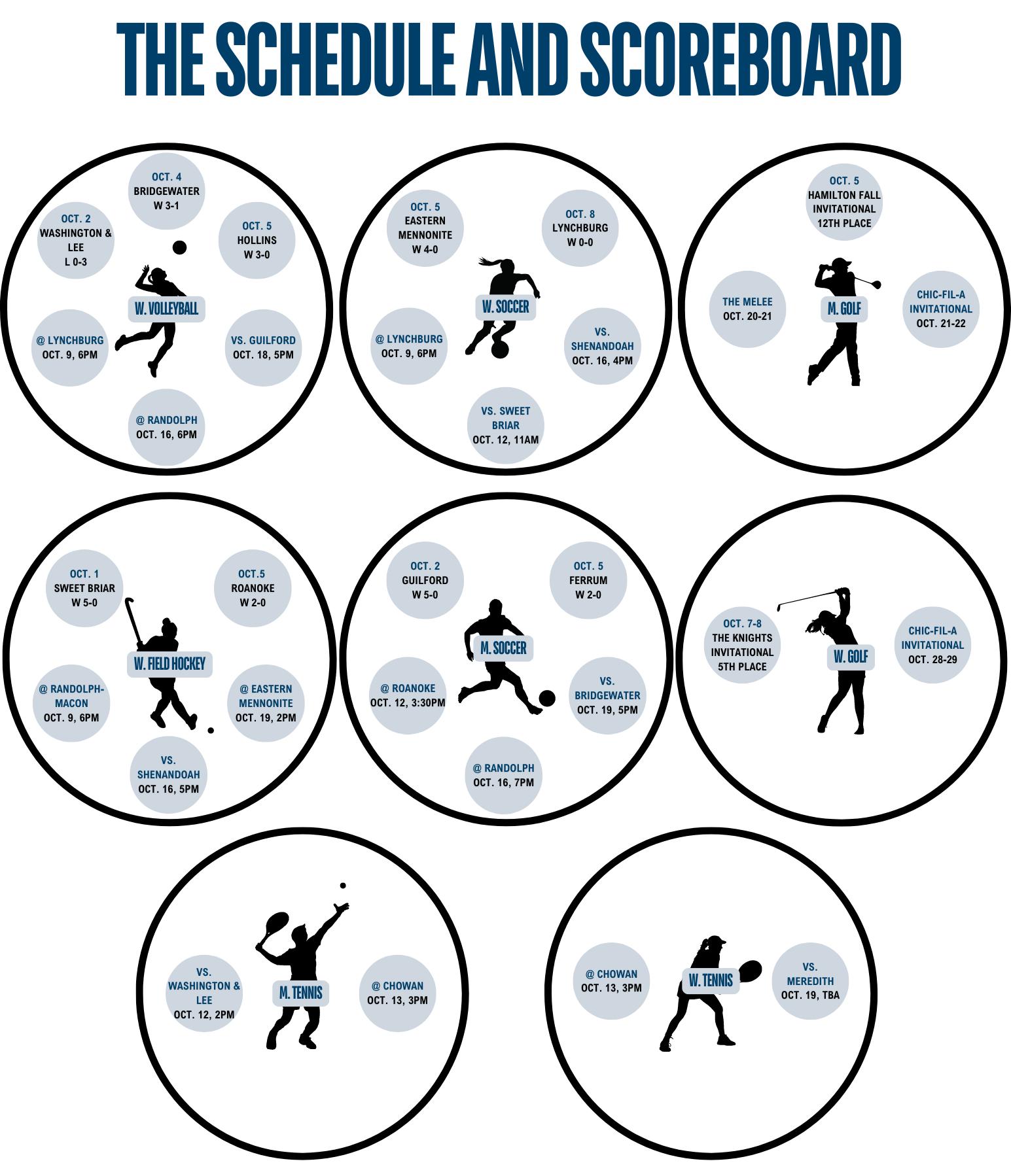
BY COY CAMISCIOLI clcamiscioli@vwu.edu
Finding successful and longterm coaches in college athletics has become a premium for programs. However, when programs find one, it can set teams up for a long time.
Virginia Wesleyan University athletics have seen their fair share of both short and long-term coaches, but there is a lot that goes into being a successful head coach.
“I think when you love your job and really enjoy the people you work with, along with recruiting student-athletes year in and year out that you want to coach, it’s a pretty good formula for success.”
Men’s Basketball Head Coach David Macedo
Head Men’s Basketball Coach
Dave Macedo will be entering his 25 season this winter and is the all-time winningest coach among all ODAC coaches, along with delivering a National Championship victory back in 2006. Macedo gave insight into what
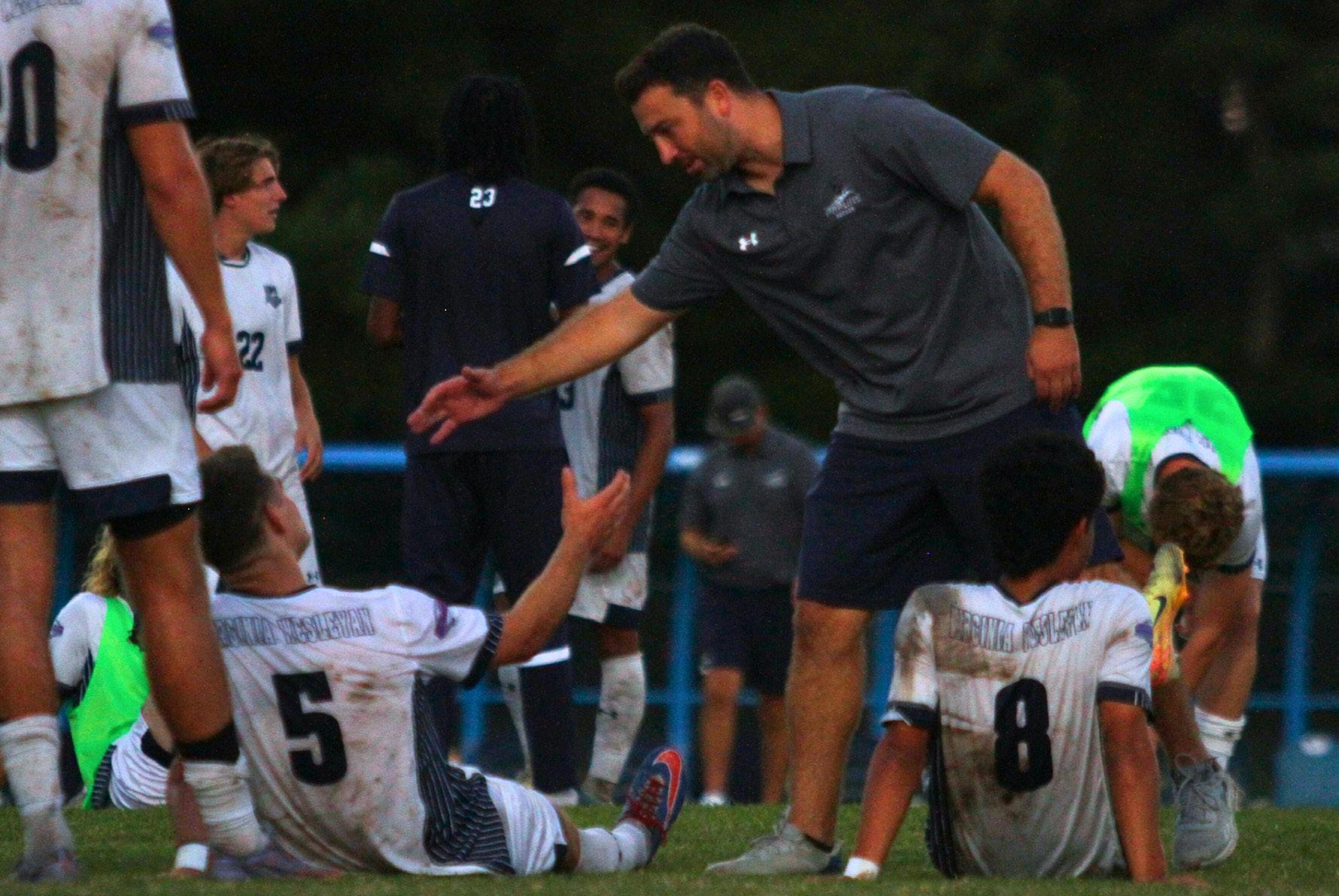
has helped him compete at a high level for this long.
“I think when you love your job and really enjoy the people you work with, along with recruiting student-athletes year in and year out that you want to coach, it’s a pretty good formula for success,” Macedo said.
Macedo has had to adapt over the years as a lot has changed since his first year at Virginia Wesleyan University.
“The biggest challenge at times has been adapting to the financials with how much more money is involved now,” Macedo said.
Over the last 20 years, the average cost of tuition and fees at a private university has increased by 181.3%, according to educationdata.org.
“It is important to make sure that we are recruiting kids that can afford it,” Macedo said.
Having a coach of Macedo’s caliber can also create a top destination for recruits along with earning respect from players.
Junior Omari DeVeaux described what it is like to play for Coach Macedo.
“It is eye-opening to be able to witness the way that he does things and how he carries himself, not only as a coach but as a person too,” DeVeaux said.
The other aspect of coaching that is not always talked about or considered is allowing players to feel comfortable with the process.
Studies have shown that by age 13, 70% of kids quit their respective sport in what could be directly related to stress and improper coaching, according to USA Today. Macedo makes sure that his players are comfortable and happy throughout the season.
“I think the best thing that he does is he lets us make decisions for ourselves sometimes. He asks us questions about certain plays on how they can be more comfortable for us and wants our team to be player-led because of the trust he has in us,” DeVeaux said.
The success not only stems from the basketball team and the coaching staff but also comes from the culture of the athletics program and Macedo is thankful for the relationships he has with other coaches.
“Watching the young coaches grow their programs has been
awesome. There is a great culture up here in athletics and will only continue to grow and get better,” Macedo said.
Building that culture has been important for incoming coaches and makes them feel better about coming to Virginia Wesleyan University.
Megan Green, the new Women’s Basketball head coach, had her fair share of success as an assistant coach at Dickinson College.
Green has felt very welcome since joining the staff here at Virginia Wesleyan.
“Every week I feel like I am sitting in a different coach’s office picking their brain about something. That has been one of my favorite parts of this job, getting to talk to the coaches in my department,” Green said.
Green seems to have a similar mindset to Macedo with her coaching style and is ready for the season to begin.
“We are going to be a team that embodies accountability, discipline and grit. And we will celebrate all of the small wins along the way,” Green said.
Green is a product of Executive Director of Intercollegiate Athletics Andrea Hoover-Erbig. Hoover-Erbig mentioned what she looks for in a coach during the hiring process.
“I want to hear their coaching philosophy, along with seeing if they did a little research on us when we have these conversations. Additionally, it’s nice to have coaches with college experience whether that is a head coach, assistant coach or a graduate assistant,” Hoover-Erbig said.
Hoover-Erbig described the process as not being super difficult, but one that needs to be very intentional with finding the right person and the right fit.
Hoover-Erbig is very thankful for having some highly established and long-term coaches to surround the athletics program.
“It’s a wonderful thing that we have Coach Macedo and Coach Bowers who have both been here for 25 years. Coach Elliot and Coach Francis as well. I believe that these are wonderful things that we celebrate,” Hoover-Erbig said.
Hoover-Erbig hopes to keep spreading the culture to the sports that may have not been able to sustain a long-term coach.
BY MATTHEW SMITH mjsmith3@vwu.edu
A thrifter’s and an antique collector’s dream, Packed House, located at 915 W 21st St. in Norfolk, brings a classy, vintage feel to life as soon as you walk in the door.
As you walk in the store, the old box TV’s and vinyl record playing in the background lays the groundwork for the atmosphere which is enhanced by the endless amount of 20th century merchandise that lines the shelves.
The welcoming attitudes of employees and customers alike add to the incredible aura of Packed House, making it a must stop for anyone who rocks the ‘90s style or collects classic albums.
The idea of opening a vintage clothing store was only able to become a reality after years of collecting a “hilarious amount,” of antique articles, co-owner Morgan Tomosovich said. He continued on to say, “We joked about what it would be like to own a shop, a joke that quickly turned into
‘maybe we should do this.’” This led to them stumbling upon an open property and spontaneously opening up shop.
When opening the shop, there was a clear goal in mind for the future of Packed House: “a home base where we could rehome and display items that we find interesting, weird or cool,” other co-owner Nick Rayfield said.
The freedom to put anything onto the shelves and have it meet a targeted audience is the driving factor behind the community established by Packed House. The inviting and accepting community allows for anyone who walks in to find something unique that fits their interests.
“All we do is put stuff in the shop that we like. We don’t work to sell things that we don’t care about,” Tomosovich said. Through tender care and consideration of their product, Packed House caters to those that are into the vintage style or just looking for something new.

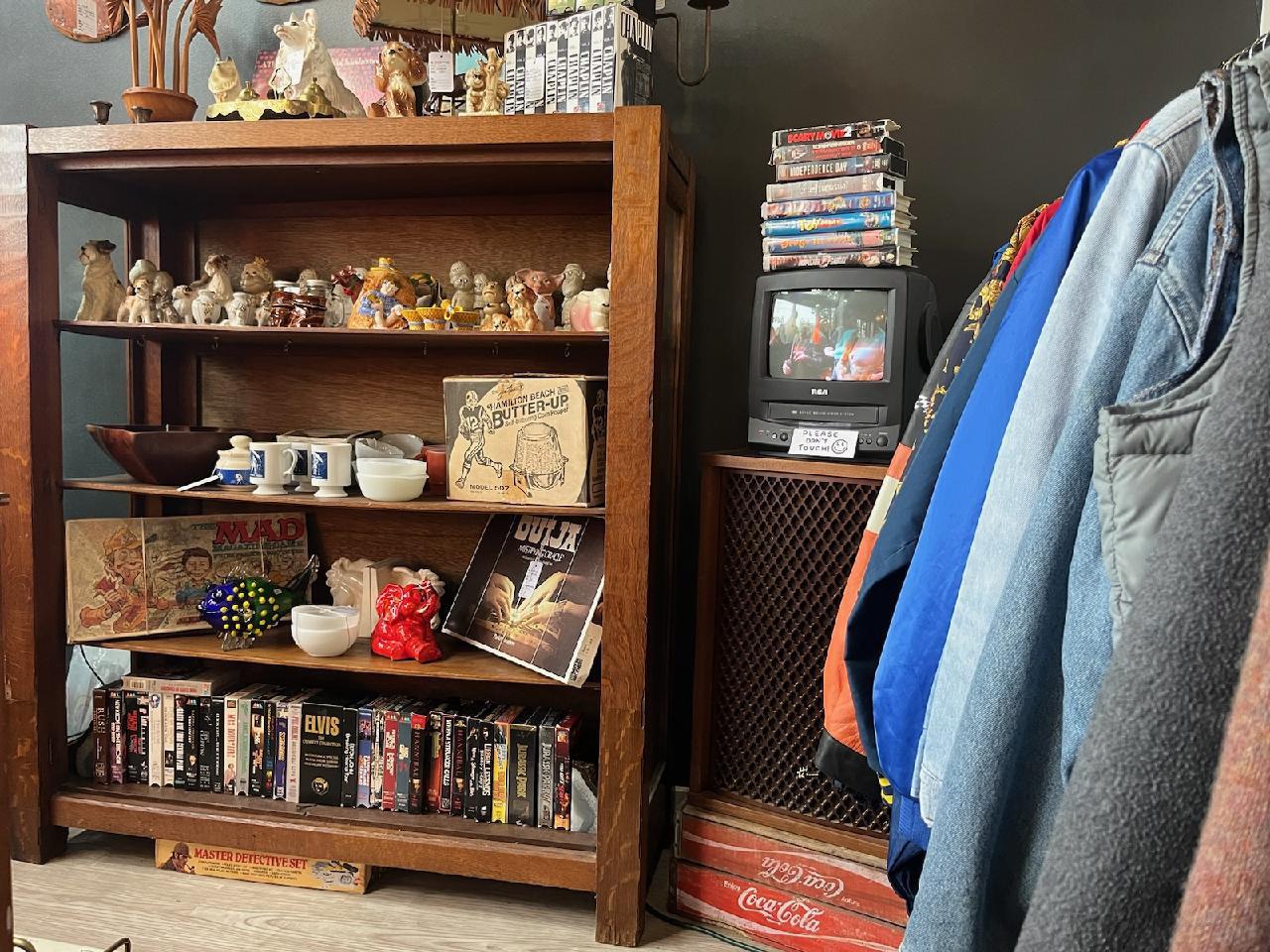
This again showcases the strong sense of community treasured and celebrated by the employees and customers of Packed House. “If you claim to be a business built around the community, but the community has nothing to do with it, is it really built around the community?” Tomosovich said.
Occasionally, and especially around holidays, Packed House hosts community events both to promote the business but also to bring together the community built around it. “We’ve held vintage markets, indoor & outdoor concerts, poetry/game nights; all sorts of stuff,” Rayfield said.
These events do more than just bring people together and promote the business as they also give opportunities to local artists and performers to promote their brand in a safe space. Packed House has an event coming up this month, The October Market, where they will be hosting more than twenty vendors on Sunday, Oct. 20, from 11:00 a.m. until 5:00 p.m. at the store front.
Although the community is a big part of what makes Packed House special, their stock is the truly unique and exciting aspect of the business.
“It’s crazy that they even own this stuff, let alone sell it,” Virginia Wesleyan University sophomore Nate Bryant said after walking in. The vast selection of vintage apparel and memorabilia is evident the moment you step in the door and each shelf grabs the customers attention.
“It isn’t really my style but I can see why people are into stuff like this, I’m having a hard time not buying anything,” freshman James Tassone said.
Packed House has found good success and reputation through creating a culture to be proud of and a unique product. The owners have stuck to their morals and created the environment they had always dreamed of through hard work and patience.
“Opening a brick and mortar is a lot more than just playing house,” Rayfield said. “Your first day opening is such a vulnerable time to show this new thing you’ve created so hopefully you made it what you wanted it to be.”
“Whether you’ve just popped in to see what the shop is about, come to an event or shopped around; we are truly grateful,” Tomosovich said, while expressing his gratitude for his customers. Packed House’s welcoming atmosphere provides a homey feeling for all who stop in, so be sure to check it out if you’re in the area.
Packed House is open Wednesday through Sunday from noon until 5:00 p.m., 6:00 p.m. or 7:00 p.m. depending on the day and hosts events on occasion. If you’re interested in something new or already a fan of vintage “stuff,” it’s a must stop no matter what.
BY ELI CASEY emcasey@vwu.edu
Tucked away in Selden Market, about 15 minutes from campus, is a hidden gem of cafes, Potted. Founded six months ago by Travis Diperna and Michele Berkhimer, Potted is a cross between a bubble tea store and house plant emporium. Featuring a soil bar, a selection of specialty loose leaf teas with free smells, tea accessories, houseplant growth kits and delicious drinks.
Despite entering the industry in May, Potted has all the makings of the next national sensation. Diperna and Berkhimer are committed to making Potted a place, and brand, that people recognize. “Big picture, we are going to be a national brand,” Diperna said.
What separates Potted from its potential competitors is its depth: Potted offers something for everyone. Whether you’re a budding tea enthusiast, a beginner plant aficionado or anything in between.
Immediately upon walking in, there is a whole rack of Potted specialty loose leaf tea available for free smells. Some of their smellable loose leaf teas are variations on classic teas like chamomile or lavender.
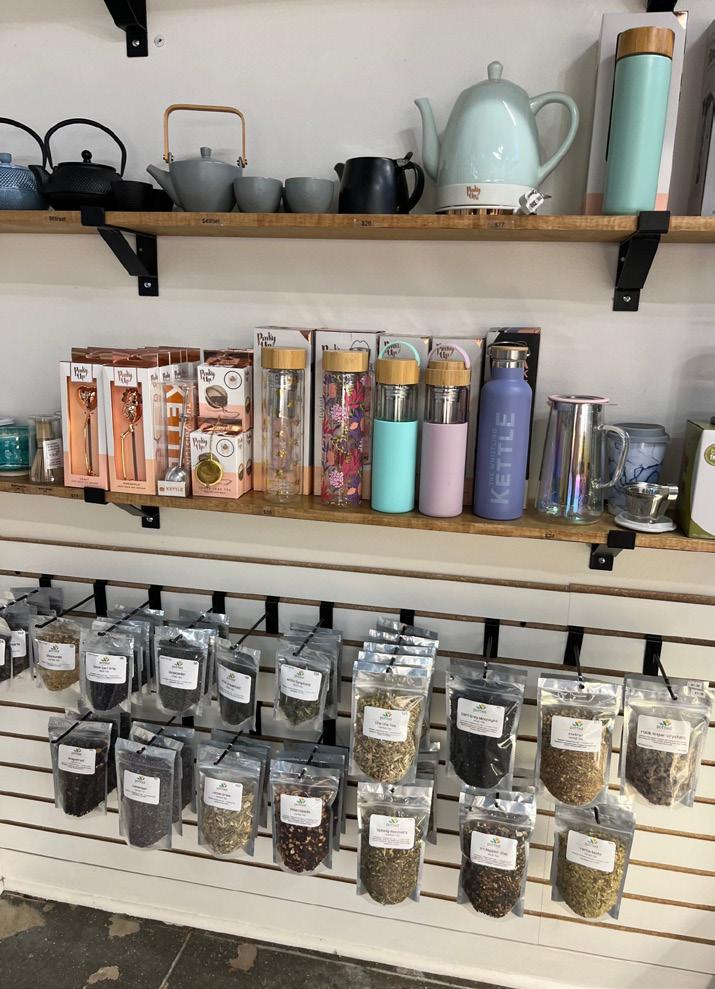
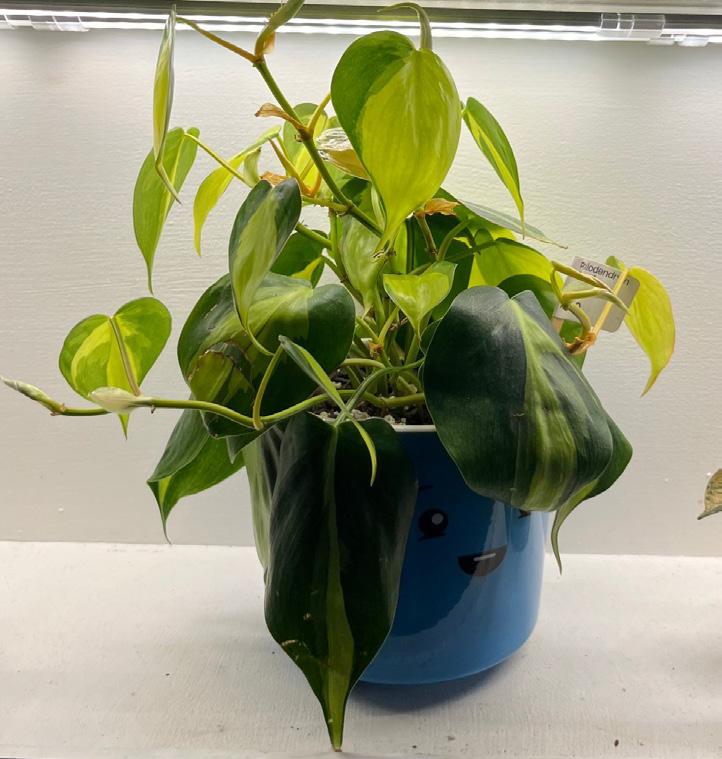
Some coax you to smell them because it’s not often you’re face to face with Blue Mango or Foxtrot flavored herbal tea.
According to Diperna, making new regulars is his favorite part of his job. “It’s one of the most rewarding parts of the job … whenever you do see someone who enjoys it, it really makes it worth it.”
The idea for Potted came about thanks to a vacation Diperna and Berkheimer took together. “We were in Denver, and I found this place called Dandelion Cafe, and they were a little tiny local house plant cafe, and I was like ‘this should be in Hampton Roads, people would love this,’” Diperna said. It seems like they do. Since starting out at farmers markets in October, eventually opening in May, Potted has grown a loyal customer base. When creating a community, “the biggest thing is education . . . knowledge is definitely one of the keys to our future success,” Diperna said.
One of the unique challenges to Potted is also what makes it special: its nature as a business. Instead of specializing in just bubble tea, plants or loose leaf tea, Diperna and Berkeimer have to be ready for all kinds of challenges.
According to Diperna, the nature of running Potted is like juggling. “You need to know which one of these balls that you’re juggling is glass and which one is rubber, you have to know which balls you can drop and which ones that if you drop, they’re going to be devastating,” Diperna said.
For instance, the plants have to be stored at very specific temperatures, and all of the tea has to be cared for – humidity is very important. “It’s not easy, it’s a lot, but that makes it worth it,” Diperna said.
Another of Potted’s draws is its soil bar.
If you purchase a plant from Potted, you can bring it back and re-fill its soil with high quality soil at their specialty soil bar.
At the soil bar you can find options that work for plants of different locations and sensitivities that can be purchased at Potted. For instance, Diperna’s favorite plant, the Boobie cactus, is really difficult to propagate, but Potted offers soil and solutions to that problem.
Potted offers a plethora of options for all of its customers, be it those looking for plants or a caffeine fix. Diperna’s personal recommendation is the Cinnamon Toast milk tea or one of Potted’s signature drinks, the Ube Dooby Doo.
The Ube Dooby Doo is a specialty purple
milk tea that uses ube instead of taro. Taro is a Korean sweet potato and ube is a Filipino sweet potato. Both are a type of sweet yam, but ube is a purple sweet yam and taro is a white yam. Taro has a much lighter flavor compared to ube, which is very nutty and reminiscent of vanilla. Customer Izabell Grimes recommended the Mermaid Bubble Tea. “It’s a really good mix of flavors that just blend amazingly together,” Grimes said.
The Mermaid Bubble Tea features coconut-pineapple milk tea, with lychee jellies and dragon fruit popping bubbles. It has a very pleasant taste with equal parts of the tangy pineapple but also the smooth and refreshing coconut. The jellies and popping fruit bubbles also add a new dimension to the drinking experience, making it highly enjoyable.
Potted is open daily 11 a.m. to 6 p.m. except on Tuesday, perfect for a midday study snack.
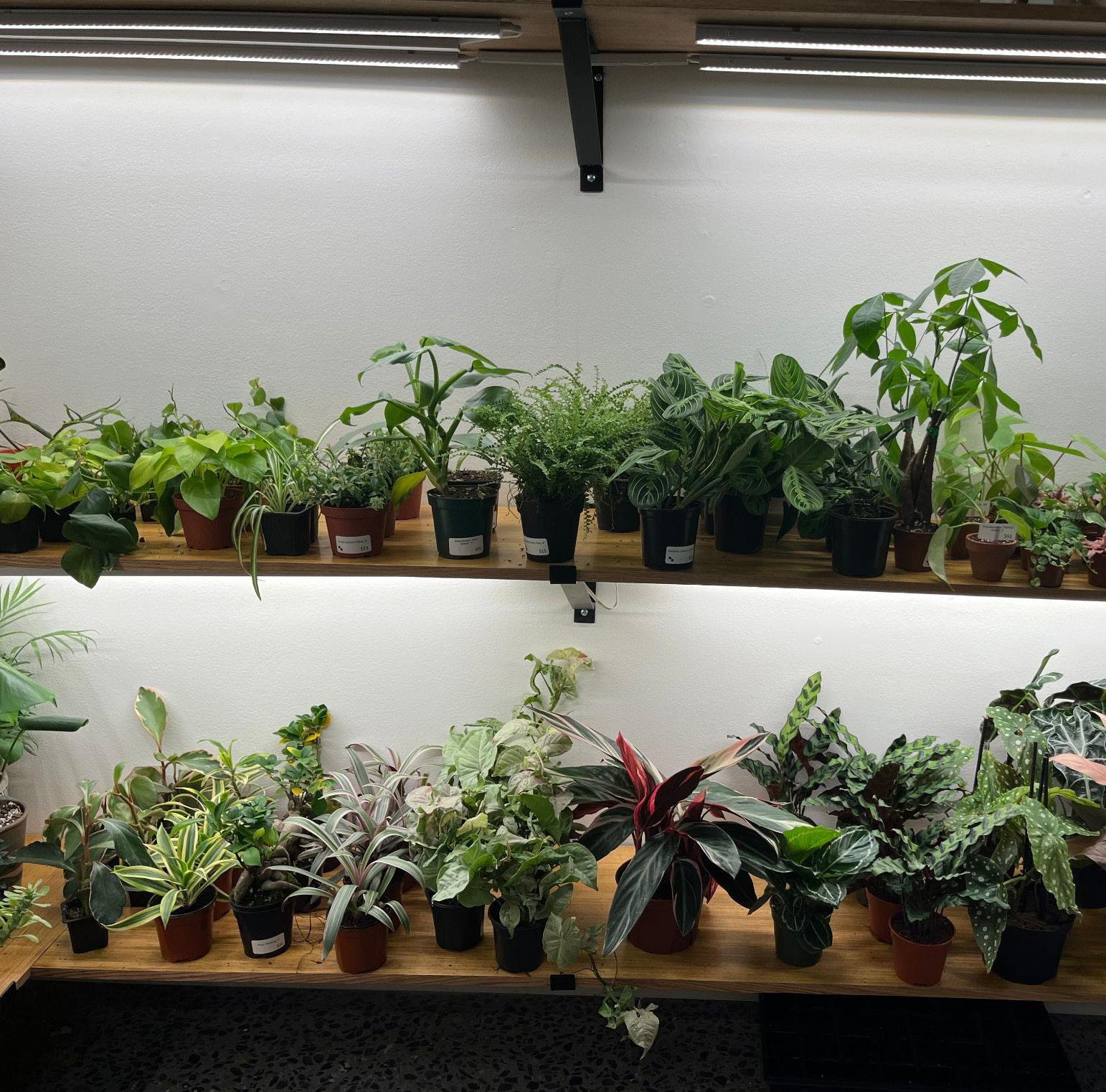
What’s your favorite dinner spot?
Dr Bill McConnell Director of Teacher Education, Batten Associate Professor of Education
Toast, in Norfolk, is one of my favorites They have a wonderful vegetarian chili that is under $8 and is very filling Their outdoor seating area is surrounded by local plants, provides shade in the summer and firepits provide warmth in the winter
Backcountry backpacking, usually in Shenandoah National Park I also like going to concerts, especially at the Norva.
your favorite weekend activity?
Dr Stu Minnis, Professor of Media and Communication
BY CALEE LUKOWSKI crlukowski@vwu.edu
Get Lost is a Hawaiian shaved ice shop at the Oceanfront that just celebrated its one year anniversary on Sunday. The brightly colored shop is a wonderful place to stop and grab an afternoon snack.
The walk-up window style is anything but impersonal with friendly workers ready to help you make a selection. With options for indoor and outdoor seating depending on the weather and season, the atmosphere of Get Lost is one of a backyard get together with old friends you haven’t seen in a while.
The workers are friendly and have a great attitude. One employee, Isabelle McGrath, said, “It’s just a great environment to work in. There’s a great sense of community.”
Regardless of your taste, there is a flavor for everyone. If you can’t find a flavor that you think you’ll enjoy, Get Lost offers the option to mix and match your own flavor. Be sure to be on the lookout for special flavors of the month. October’s spooky specials are “Spookies and Cream” and “Frankenapple”.
The portion sizes are pretty large, making it easy to share with one or more friends. Overall, Get Lost is a great place to hang out with friends, catch up, and take a break from the busy push and pull of everyday life.
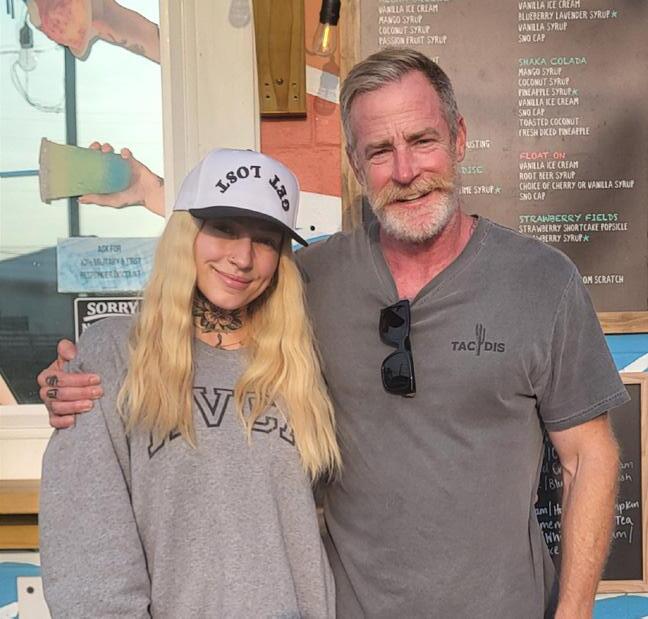
her love language. “That’s how I like to express love and appreciation. I’ll order, you know, Crumbl Cookies or take people to my favorite dessert spot, if they’re having a bad day,” Stephanie said.
That business plan soon came to life in an adorable island-themed dessert shop located in the Vibe District of Virginia Beach, fitting

Virginia Beach.
Where do you like to go for coffee or tea?
Dr. Tyler Lehrer, Assistant Professor of History
I like to drop by my neighborhood cafe and roaster, aLatte Cafe, for a double-shot latte and a breakfast sandwich. I also like that they roast their beans in-house, always a great spot to pick up a pound of freshly-roasted coffee
We stop at Bergey's Breadbasket at least every few weeks on the way to my parents' house. I can honestly say Bergey's beats any ice cream I have ever consumed anywhere in the world: the Black Raspberry, Peach, Chocolate and Pumpkin are the best Their pumpkin pies are also fantastic.
What local businesses do you love to support?
Dr. Benjamin Haller Associate Professor of Classics
With dairy free options and all gluten free syrups, Get Lost offers a sweet treat that can be enjoyed by everyone. Most of the syrups used at Get Lost are made in house and from scratch at the beginning of every week. Get Lost also works with a local creamery to get most of their ice creams locally.
“It’s such a great place to spend some time at. It’s also so cool to see small local businesses supporting each other this way,” said VWU sophomore Madison Mellon. Get Lost was an idea first thought up by co-owners Stephanie and Todd Askins while on their honeymoon in Hawaii. While there Stephanie fell in love with the traditional dessert and wanted to bring something like it to Virginia Beach. “So on the plane ride back, we were already writing our business plan,” Stephanie said.
Stephanie, a self proclaimed dessert fanatic, spoke about how desserts are
Get Lost isn’t only a dessert shop though. They also have a food truck that can be seen at many of the events at the Oceanfront. There are also some events in the works for the new business. “I’m in talks right now with a couple of women owned businesses that are in the oceanfront area. We’re going to try to do, like, a vendor event later in November,” Stephanie said.
Hawaiian Shaved Ice isn’t all that Get Lost sells. They have lots of fun printed merchandise for sale as well, including t-shirts, sweatshirts, hats and more. If dessert isn’t really your style, they also offer a select variety of drinks with their in house syrups. If you’re interested in a sweet treat, check out Get Lost’s Instagram page @getlostvb for their hours, specials and more. If you’re in the Vibe District, be sure to stop by 510 Virginia Beach Blvd. for an experience you won’t regret.
